Chinua Achebe
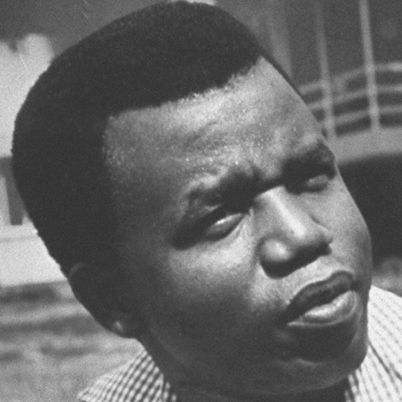
(1930-2013)

Who Was Chinua Achebe?
Chinua Achebe made a splash with the publication of his first novel, Things Fall Apart , in 1958. Renowned as one of the seminal works of African literature, it has since sold more than 20 million copies and been translated into more than 50 languages. Achebe followed with novels such as No Longer at Ease (1960), Arrow of God (1964) and Anthills of the Savannah (1987) , and served as a faculty member at renowned universities in the U.S. and Nigeria. He died on March 21, 2013, at age 82, in Boston, Massachusetts.
Early Years and Career
Famed writer and educator Chinua Achebe was born Albert Chinualumogu Achebe on November 16, 1930, in the Igbo town of Ogidi in eastern Nigeria. After becoming educated in English at University College (now the University of Ibadan) and a subsequent teaching stint, Achebe joined the Nigerian Broadcasting Corporation in 1961 as director of external broadcasting. He would serve in that role until 1966.
'Things Fall Apart'
In 1958, Achebe published his first novel: Things Fall Apart . The groundbreaking novel centers on the clash between native African culture and the influence of white Christian missionaries and the colonial government in Nigeria. An unflinching look at the discord, the book was a startling success and became required reading in many schools across the world.
'No Longer at Ease' and Teaching Positions
The 1960s proved to be a productive period for Achebe. In 1961, he married Christie Chinwe Okoli, with whom he would go on to have four children, and it was during this decade he wrote the follow-up novels to Things Fall Apart : No Longer at Ease (1960) and Arrow of God (1964), as well as A Man of the People (1966). All address the issue of traditional ways of life coming into conflict with new, often colonial, points of view.
In 1967, Achebe and poet Christopher Okigbo co-founded the Citadel Press, intended to serve as an outlet for a new kind of African-oriented children's books. Okigbo was killed shortly afterward in the Nigerian civil war, and two years later, Achebe toured the United States with fellow writers Gabriel Okara and Cyprian Ekwensi to raise awareness of the conflict back home, giving lectures at various universities.
Through the 1970s, Achebe served in faculty positions at the University of Massachusetts, the University of Connecticut and the University of Nigeria. During this time, he also served as director of two Nigerian publishing houses, Heinemann Educational Books Ltd. and Nwankwo-Ifejika Ltd.
On the writing front, Achebe remained highly productive in the early part of the decade, publishing several collections of short stories and a children's book: How the Leopard Got His Claws (1972). Also released around this time were the poetry collection Beware, Soul Brother (1971) and Achebe's first book of essays, Morning Yet on Creation Day (1975).
In 1975, Achebe delivered a lecture at UMass titled "An Image of Africa: Racism in Conrad's Heart of Darkness ," in which he asserted that Joseph Conrad's famous novel dehumanizes Africans. When published in essay form, it went on to become a seminal postcolonial African work.
Later Work and Accolades
The year 1987 brought the release of Achebe's Anthills of the Savannah. His first novel in more than 20 years, it was shortlisted for the Booker McConnell Prize. The following year, he published Hopes and Impediments .
The 1990s began with tragedy: Achebe was in a car accident in Nigeria that left him paralyzed from the waist down and would confine him to a wheelchair for the rest of his life. Soon after, he moved to the United States and taught at Bard College, just north of New York City, where he remained for 15 years. In 2009, Achebe left Bard to join the faculty of Brown University in Providence, Rhode Island, as the David and Marianna Fisher University professor and professor of Africana studies.
Achebe won several awards over the course of his writing career, including the Man Booker International Prize (2007) and the Dorothy and Lillian Gish Prize (2010). Additionally, he received honorary degrees from more than 30 universities around the world.
Achebe died on March 21, 2013, at the age of 82, in Boston, Massachusetts.
QUICK FACTS
- Name: Chinua Achebe
- Birth Year: 1930
- Birth date: November 16, 1930
- Birth City: Ogidi, Anambra
- Birth Country: Nigeria
- Gender: Male
- Best Known For: Chinua Achebe was a Nigerian novelist and author of 'Things Fall Apart,' a work that in part led to his being called the 'patriarch of the African novel.'
- Education and Academia
- Fiction and Poetry
- Astrological Sign: Scorpio
- University of Ibadan
- Nacionalities
- Death Year: 2013
- Death date: March 21, 2013
- Death State: Massachusetts
- Death City: Boston
- Death Country: United States
CITATION INFORMATION
- Article Title: Chinua Achebe Biography
- Author: Biography.com Editors
- Website Name: The Biography.com website
- Url: https://www.biography.com/writer/chinua-achebe
- Access Date:
- Publisher: A&E; Television Networks
- Last Updated: January 19, 2021
- Original Published Date: April 2, 2014
- Art is man's constant effort to create for himself a different order of reality from that which is given to him.
- When suffering knocks at your door and you say there is no seat for him, he tells you not to worry because he has brought his own stool.
- One of the truest tests of integrity is its blunt refusal to be compromised.
Famous Authors & Writers
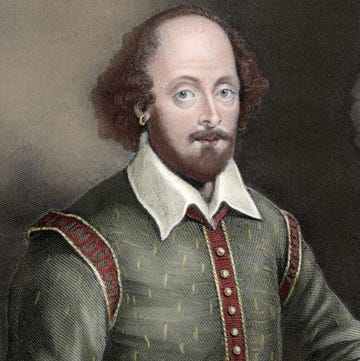
9 Surprising Facts About Truman Capote

William Shakespeare
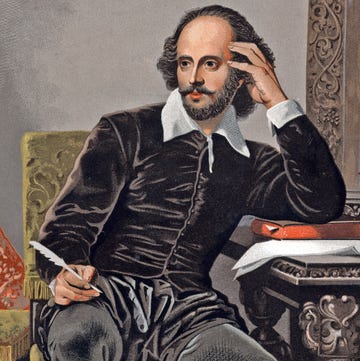
How Did Shakespeare Die?
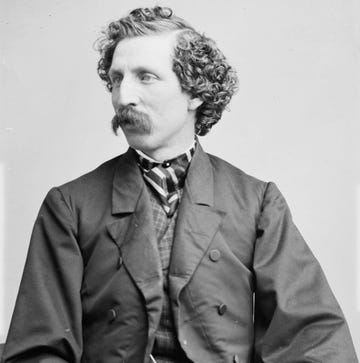
Meet Stand-Up Comedy Pioneer Charles Farrar Browne
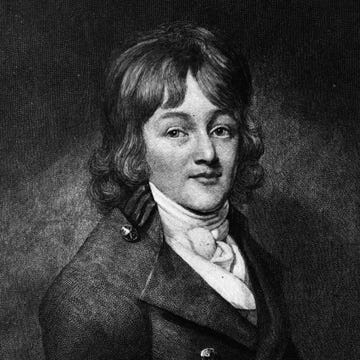
Francis Scott Key
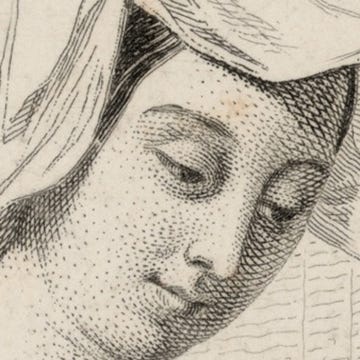
Christine de Pisan
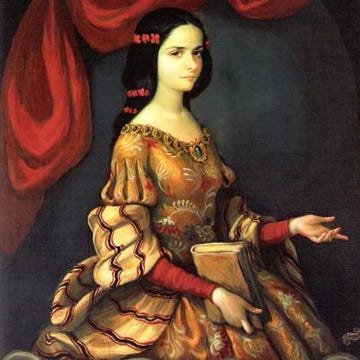
Sor Juana Inés de la Cruz
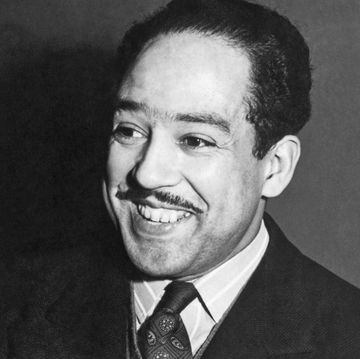
10 Famous Langston Hughes Poems

5 Crowning Achievements of Maya Angelou
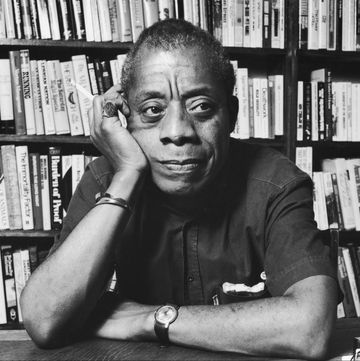
10 Black Authors Who Shaped Literary History

The True Story of Feud:Capote vs. The Swans
Biography of Chinua Achebe, Author of "Things Fall Apart"
Eamonn McCabe / Getty Images
- Authors & Texts
- Top Picks Lists
- Study Guides
- Best Sellers
- Plays & Drama
- Shakespeare
- Short Stories
- Children's Books
- M.A., Anthropology, University of Iowa
- B.Ed., Illinois State University
Chinua Achebe (born Albert Chinualumogu Achebe; November 16, 1930–March 21, 2013) was a Nigerian writer described by Nelson Mandela as one "in whose company the prison walls fell down." He is best known for his African trilogy of novels documenting the ill effects of British colonialism in Nigeria, the most famous of which is " Things Fall Apart ."
Fast Facts: Chinua Achebe
- Occupation : Author and professor
- Born : November 16, 1930 in Ogidi, Nigeria
- Died : March 21, 2013 in Boston, Massachusetts
- Education : University of Ibadan
- Selected Publications : Things Fall Apart , No Longer at Ease , Arrow of God
- Key Accomplishment : Man Booker International Prize (2007)
- Famous Quote : "There is no story that is not true."
Early Years
Chinua Achebe was born in Ogidi, an Igbo village in Anambra, southern Nigeria . He was the fifth of six children born to Isaiah and Janet Achebe, who were among the first converts to Protestantism in the region. Isaiah worked for a missionary teacher in various parts of Nigeria before returning to his village.
Achebe's name means "May God Fight on My Behalf" in Igbo. He later famously dropped his first name, explaining in an essay that at least he had one thing in common with Queen Victoria: they had both "lost [their] Albert."
Achebe grew up as a Christian, but many of his relatives still practiced their ancestral polytheistic faith. His earliest education took place at a local school where children were forbidden to speak Igbo and encouraged to disown their parents' religion.
At 14, Achebe was accepted into an elite boarding school, the Government College at Umuahia. One of his classmates was the poet Christopher Okigbo, who became Achebe's lifelong friend.
In 1948, Achebe won a scholarship to the University of Ibadan to study medicine, but after a year he changed his major to writing. At university, he studied English literature and language, history, and theology.
Becoming a Writer
At Ibadan, Achebe's professors were all Europeans, and he read British classics including Shakespeare, Milton, Defoe, Conrad, Coleridge, Keats, and Tennyson. But the book that inspired his writing career was British-Irish Joyce Cary's 1939 novel set in southern Nigeria, called "Mister Johnson."
The portrayal of Nigerians in "Mister Johnson" was so one-sided, so racist and painful, that it awoke in Achebe a realization of the power of colonialism over him personally. He admitted to having an early fondness for Joseph Conrad 's writing, but came to call Conrad a "bloody racist" and said that " The Heart of Darkness " was "an offensive and deplorable book."
This awakening inspired Achebe to begin writing his classic, "Things Fall Apart," with a title from the poem by William Butler Yeats , and a story set in the 19th century. The novel follows Okwonko, a traditional Igbo man, and his futile struggles with the power of colonialism and the blindness of its administrators.
Work and Family
Achebe graduated from the University of Ibadan in 1953 and soon became a scriptwriter for the Nigerian Broadcasting Service, eventually becoming the head programmer for the discussion series. In 1956, he visited London for the first time to take a training course with the BBC. On returning, he moved to Enugu and edited and produced stories for the NBS. In his spare time, he worked on "Things Fall Apart." The novel was published in 1958.
His second book, "No Longer at Ease," published in 1960, is set in the last decade before Nigeria achieved independence . Its protagonist is Okwonko's grandson, who learns to fit into British colonial society (including political corruption, which causes his downfall).
In 1961, Chinua Achebe met and married Christiana Chinwe Okoli, and they eventually had four children: daughters Chinelo and Nwando, and twin sons Ikechukwu and Chidi. The third book in the African trilogy, "Arrow of God," was published in 1964. It describes an Igbo priest Ezeulu, who sends his son to be educated by Christian missionaries, where the son is converted to colonialism, attacking Nigerian religion and culture.
Biafra and "A Man of the People"
Achebe published his fourth novel, "A Man of the People," in 1966. The novel tells the story of the widespread corruption of Nigerian politicians and ends in a military coup.
As an ethnic Igbo, Achebe was a staunch supporter of Biafra's unsuccessful attempt to secede from Nigeria in 1967. The events that occurred and led to the three-year-long civil war that followed that attempt closely paralleled what Achebe had described in "A Man of the People," so closely that he was accused of being a conspirator.
During the conflict, thirty thousand Igbo were massacred by government-backed troops. Achebe's house was bombed and his friend Christopher Okigbo was killed. Achebe and his family went into hiding in Biafra, then fled to Britain for the duration of the war.
Academic Career and Later Publications
Achebe and his family moved back to Nigeria after the civil war ended in 1970. Achebe became a research fellow at the University of Nigeria at Nsukke, where he founded "Okike," an important journal for African creative writing.
From 1972–1976, Achebe held a visiting professorship in African literature at the University of Massachusetts at Amherst. After that, he returned again to teach at the University of Nigeria. He became chair of the Association of Nigerian Writers and edited "Uwa ndi Igbo," a journal of Igbo life and culture. He was relatively active in opposition politics, as well: he was elected deputy national president of the People's Redemption Party and published a political pamphlet called "The Trouble with Nigeria" in 1983.
Although he wrote many essays and kept involved with the writing community, Achebe did not write another book until 1988's "Anthills in the Savannah," about three former school friends who become a military dictator, an editor of the leading newspaper, and the minister of information.
In 1990, Achebe was involved in a car crash in Nigeria, which damaged his spine so badly he was paralyzed from the waist down. Bard College in New York offered him a job teaching and the facilities to make that possible, and he taught there from 1991–2009. In 2009, Achebe became a professor of African studies at Brown University.
Achebe continued to travel and lecture around the world. In 2012, he published the essay "There Was a Country: A Personal History of Biafra."
Death and Legacy
Achebe died in Boston, Massachusetts, on March 21, 2013, after a brief illness. He is credited with changing the face of world literature by presenting the effects of European colonization from the point of view of Africans. He specifically wrote in English, a choice that received some criticism, but his intent was to speak to the whole world about the real problems that the influence of Western missionaries and colonialists created in Africa.
Achebe won the Man Booker International Prize for his life's work in 2007 and received more than 30 honorary doctorates. He remained critical of the corruption of Nigerian politicians, condemning those that stole or squandered the nation's oil reserves. In addition to his own literary success, he was a passionate and active supporter of African writers.
- Arana, R. Victoria, and Chinua Achebe. " The Epic Imagination: A Conversation with Chinua Achebe at Annandale-on-Hudson, October 31, 1998 ." Callaloo, vol. 25, no. 2, Spring 2002, pp. 505–26.
- Ezenwa-Ohaeto. Chinua Achebe: A Biography . Bloomington: Indiana University Press, 1997.
- Garner, Dwight. " Bearing Witness, with Words. " The New York Times, March 23, 2013.
- Kandell, Jonathan. " Chinua Achebe, African Literary Titan, Dies at 82 ." The New York Times, March 23, 2013.
- McCrummen, Stephanie, and Adam Bernstein. " Chinua Achebe, Groundbreaking Nigerian Novelist, Dies at 82 ." The Washington Post, March 22, 2013.
- Snyder, Carey. " The Possibilities and Pitfalls of Ethnographic Readings: Narrative Complexity in 'Things Fall Appart' ." College Literature , vol. 35 no. 2, 2008, p. 154-174.
- 'Things Fall Apart' Overview
- 'Things Fall Apart' Discussion Questions and Study Guide
- 'Things Fall Apart' Themes, Symbols, and Literary Devices
- 'Things Fall Apart' Characters
- 'Things Fall Apart' Quotes
- 'Things Fall Apart' Summary
- Top 10 Books for High School Seniors
- West African Pidgin English (WAPE)
- Philip Emeagwali, Nigerian American Computer Pioneer
- What You Should Know About Nigeria
- Nigerian English
- Biography of Philip Roth, American Novelist, Short-Story Writer
- 10th (or 11th) Grade Reading List
- The Benin Empire
- James Meredith: First Black Student to Attend Ole Miss
- 5 Famous Classic Italian Writers
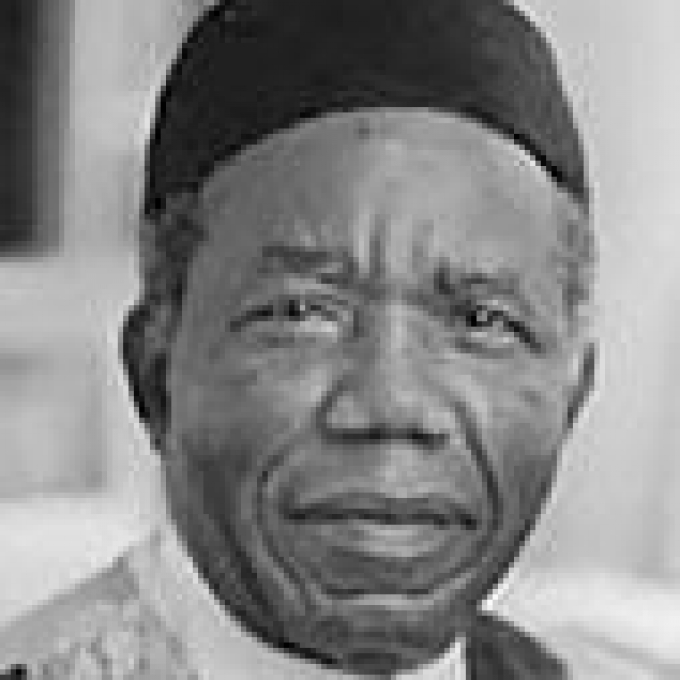
Chinua Achebe
- Non-Fiction
- Penguin Group (UK)
- The Wylie Agency (UK) Ltd
Chinua Achebe was born in Nigeria in 1930.
He was raised in the large village of Ogidi, one of the first centres of Anglican missionary work in Eastern Nigeria, and is a graduate of University College, Ibadan.
His early career in radio ended abruptly in 1966, when he left his post as Director of External Broadcasting in Nigeria during the national upheaval that led to the Biafran War. Achebe joined the Biafran Ministry of Information and represented Biafra on various diplomatic and fund-raising missions. He was appointed Senior Research Fellow at the University of Nigeria, Nsukka, and began lecturing widely abroad. For more than 15 years he was the Carles P. Stevenson Jr Professor of Languages and Literature at Bard College; he then became the David and Marianna Fisher University Professor and Professor of Africana Studies at Brown University.
Chinua Achebe wrote more than 20 books - novels, short stories, essays and collections of poetry - including Things Fall Apart (1958), which has sold more than 10 million copies worldwide and been translated into more than 50 languages; Arrow of God (1964); Beware, Soul Brother and Other Poems (1971), winner of the Commonwealth Poetry Prize; Anthills of the Savannah (1987), which was shortlisted for the Booker Prize for Fiction; Hopes and Impediments: Selected Essays (1988); and Home and Exile (2000).
Chinua Achebe received numerous honours from around the world, including the Honorary Fellowship of the American Academy of Arts and Letters, as well as honorary doctorates from more than 30 colleges and universities. He was also the recipient of Nigeria's highest award for intellectual achievement, the Nigerian National Merit Award. In 2007, he won the Man Booker International Prize. He died on 22nd March 2013.
Bibliography
Sign up to the newsletter.

- Things Fall Apart
Chinua Achebe
- Literature Notes
- Chinua Achebe Biography
- Book Summary
- About Things Fall Apart
- Character List
- Summary and Analysis
- Part 1: Chapter 1
- Part 1: Chapter 2
- Part 1: Chapter 3
- Part 1: Chapter 4
- Part 1: Chapter 5
- Part 1: Chapter 6
- Part 1: Chapter 7
- Part 1: Chapter 8
- Part 1: Chapter 9
- Part 1: Chapter 10
- Part 1: Chapter 11
- Part 1: Chapter 12
- Part 1: Chapter 13
- Part 2: Chapter 14
- Part 2: Chapter 15
- Part 2: Chapter 16
- Part 2: Chapter 17
- Part 2: Chapter 18
- Part 2: Chapter 19
- Part 3: Chapter 20
- Part 3: Chapter 21
- Part 3: Chapter 22
- Part 3: Chapter 23
- Part 3: Chapter 24
- Part 3: Chapter 25
- Character Analysis
- Reverend James Smith
- Character Map
- Critical Essays
- Major Themes in Things Fall Apart
- Use of Language in Things Fall Apart
- Full Glossary for Things Fall Apart
- Essay Questions
- Cite this Literature Note
Early Years
Chinua Achebe (pronounced Chee- noo-ah Ah- chay -bay) is considered by many critics and teachers to be the most influential African writer of his generation. His writings, including the novel Things Fall Apart , have introduced readers throughout the world to creative uses of language and form, as well as to factual inside accounts of modern African life and history. Not only through his literary contributions but also through his championing of bold objectives for Nigeria and Africa, Achebe has helped reshape the perception of African history, culture, and place in world affairs.
The first novel of Achebe's, Things Fall Apart , is recognized as a literary classic and is taught and read everywhere in the English-speaking world. The novel has been translated into at least forty-five languages and has sold several million copies. A year after publication, the book won the Margaret Wong Memorial Prize, a major literary award.
Achebe was born in the Igbo (formerly spelled Ibo ) town of Ogidi in eastern Nigeria on November 16, 1930, the fifth child of Isaiah Okafor Achebe and Janet Iloegbunam Achebe. His father was an instructor in Christian catechism for the Church Missionary Society. Nigeria was a British colony during Achebe's early years, and educated English-speaking families like the Achebes occupied a privileged position in the Nigerian power structure. His parents even named him Albert, after Prince Albert, the husband of Queen Victoria of Great Britain. (Achebe himself chose his Igbo name when he was in college.)
Achebe attended the Church Missionary Society's school where the primary language of instruction for the first two years was Igbo. At about eight, he began learning English. His relatively late introduction to English allowed Achebe to develop a sense of cultural pride and an appreciation of his native tongue — values that may not have been cultivated had he been raised and taught exclusively in English. Achebe's home fostered his understanding of both cultures: He read books in English in his father's library, and he spent hours listening to his mother and sister tell traditional Igbo stories.
At fourteen, Achebe was selected to attend the Government College in Umuahia, the equivalent of a university preparatory school and considered the best in West Africa. Achebe excelled at his studies, and after graduating at eighteen, he was accepted to study medicine at the new University College at Ibadan, a member college of London University at the time. The demand for educated Nigerians in the government was heightened because Nigeria was preparing for self-rule and independence. Only with a college degree was a Nigerian likely to enter the higher ranks of the civil service.
The growing nationalism in Nigeria was not lost on Achebe. At the university, he dropped his English name "Albert" in favor of the Igbo name "Chinua," short for Chinualumogo. Just as Igbo names in Things Fall Apart have literal meanings, Chinualumogo is translated as "My spirit come fight for me."
At University College, Achebe switched his studies to liberal arts, including history, religion, and English. His first published stories appeared in the student publication the University Herald . These stories have been reprinted in the collection Girls at War and Other Stories , which was published in 1972. Of his student writings, only a few are significantly relative to his more mature works; short stories such as "Marriage is a Private Affair" and "Dead Man's Path" explore the conflicts that arise when Western culture meets African society.
Career Highlights
After graduating with a Bachelor of Arts degree in 1953, Achebe joined the Nigerian Broadcasting Corporation as a producer of radio talks. In 1956, he went to London to attend the British Broadcasting Corporation (BBC) Staff School. While in London, he submitted the manuscript for Things Fall Apart to a publisher, with the encouragement and support of one of his BBC instructors, a writer and literary critic. The novel was published in 1958 by Heinemann, a publishing firm that began a long relationship with Achebe and his work. Fame came almost instantly. Achebe has said that he never experienced the life of a struggling writer.
Upon returning to Nigeria, Achebe rose rapidly within the Nigerian Broadcasting Corporation. As founder and director of the Voice of Nigeria in 1961, Achebe and his colleagues aimed at developing more national identity and unity through radio programs that highlighted Nigerian affairs and culture.
Political Problems
Turmoil in Nigeria from 1966 to 1972 was matched by turmoil for Achebe. In 1966, young Igbo officers in the Nigerian army staged a coup d'ètat. Six months later, another coup by non-Igbo officers overthrew the Igbo-led government. The new government targeted Achebe for persecution, knowing that his views were unsympathetic to the new regime. Achebe fled to Nsukka in eastern Nigeria, which is predominantly Igbo-speaking, and he became a senior research fellow at the University of Nigeria, Nsukka. In 1967, the eastern part of Nigeria declared independence as the nation of Biafra. This incident triggered thirty months of civil war that ended only when Biafra was defeated. Achebe then fled to Europe and America, where he wrote and talked about Biafran affairs.
Later Writing
Like many other African writers, Achebe believes that artistic and literary works must deal primarily with the problems of society. He has said that "art is, and always was, at the service of man" rather than an end in itself, accountable to no one. He believes that "any good story, any good novel, should have a message, should have a purpose."
Continuing his relationship with Heinemann, Achebe published four other novels: No Longer at Ease (the 1960 sequel to Things Fall Apart ), Arrow of God (1964), A Man of the People (1966), and Anthills of the Savannah (1987). He also wrote and published several children's books that express his basic views in forms and language understandable to young readers.
In his later books, Achebe confronts the problems faced by Nigeria and other newly independent African nations. He blames the nation's problems on the lack of leadership in Nigeria since its independence. In 1983, he published The Trouble with Nigeria , a critique of corrupt politicians in his country. Achebe has also published two collections of short stories and three collections of essays. He is the founding editor of Heinemann's African Writers series; the founder and publisher of Uwa Ndi Igbo : A Bilingual Journal of Igbo Life and Arts ; and the editor of the magazine Okike , Nigeria's leading journal of new writing.
Teaching and Literary Awards
In addition to his writing career, Achebe maintained an active teaching career. In 1972, he was appointed to a three-year visiting professorship at the University of Massachusetts at Amherst and, in 1975, to a one-year visiting professorship at the University of Connecticut. In 1976, with matters sufficiently calm in Nigeria, he returned as professor of English at the University of Nigeria, Nsukka, with which he had been affiliated since 1966. In 1990, he became the Charles P. Stevenson, Jr., professor of literature at Bard College, Annandale, New York.
Achebe received many awards from academic and cultural institutions around the world. In 1959, he won the Margaret Wong Memorial Prize for Things Fall Apart . The following year, after the publication of its sequel, No Longer At Ease , he was awarded the Nigerian National Trophy for Literature. His book of poetry, Christmas in Biafra , written during the Nigerian civil war, won the first Commonwealth Poetry Prize in 1972. More than twenty universities in Great Britain, Canada, Nigeria, and the United States have awarded Achebe honorary degrees.
Achebe died on March 21, 2013. He was 82.
Previous Character Map
Next Major Themes in Things Fall Apart
- World Biography
Chinua Achebe Biography
Born: November 15, 1930 Ogidi, Nigeria Nigerian novelist
Chinua Achebe is one of Nigeria's greatest novelists. His novels are written mainly for an African audience, but having been translated into more than forty languages, they have found worldwide readership.
Chinua Achebe was born on November 15, 1930, in Ogidi in Eastern Nigeria. His family belonged to the Igbo tribe, and he was the fifth of six children. Representatives of the British government that controlled Nigeria convinced his parents, Isaiah Okafor Achebe and Janet Ileogbunam, to abandon their traditional religion and follow Christianity. Achebe was brought up as a Christian, but he remained curious about the more traditional Nigerian faiths. He was educated at a government college in Umuahia, Nigeria, and graduated from the University College at Ibadan, Nigeria, in 1954.
Successful first effort
Achebe was unhappy with books about Africa written by British authors such as Joseph Conrad (1857–1924) and John Buchan (1875–1940), because he felt the descriptions of African people were inaccurate and insulting. While working for the Nigerian Broadcasting Corporation he composed his first novel, Things Fall Apart (1959), the story of a traditional warrior hero who is unable to adapt to changing conditions in the early days of British rule. The book won immediate international recognition and also became the basis for a play by Biyi Bandele. Years later, in 1997, the Performance Studio Workshop of Nigeria put on a production of the play, which was then presented in the United States as part of the Kennedy Center's African Odyssey series in 1999. Achebe's next two novels, No Longer At Ease (1960) and Arrow of God (1964), were set in the past as well.
By the mid-1960s the newness of independence had died out in Nigeria, as the country faced the political problems common to many of the other states in modern Africa. The Igbo, who had played a leading role in Nigerian politics, now began to feel that the Muslim Hausa people of Northern Nigeria considered the Igbos second-class citizens. Achebe wrote A Man of the People (1966), a story about a crooked Nigerian politician. The book was published at the very moment a military takeover removed the old political leadership. This made some Northern military officers suspect that Achebe had played a role in the takeover, but there was never any evidence supporting the theory.
Political crusader
During the years when Biafra attempted to break itself off as a separate state from Nigeria (1967–70), however, Achebe served as an ambassador (representative) to Biafra. He traveled to different countries discussing the problems of his people, especially the starving and slaughtering of Igbo children. He wrote articles for newspapers and magazines about the Biafran struggle and founded the Citadel Press with Nigerian poet Christopher Okigbo. Writing a novel at this time was out of the question, he said during a 1969 interview: "I can't write a novel now; I wouldn't want to. And even if I wanted to, I couldn't. I can write poetry—something short, intense, more in keeping with my mood." Three volumes of poetry emerged during this time, as well as a collection of short stories and children's stories.
After the fall of the Republic of Biafra, Achebe continued to work at the University of Nigeria at Nsukka, and devoted time to the Heinemann Educational Books' Writers Series (which was designed to promote the careers of young African writers). In 1972 Achebe came to the United States to become an English professor at the University of Massachusetts at Amherst (he taught there again in 1987). In 1975 he joined the faculty at the University of Connecticut. He returned to the University of Nigeria in 1976. His novel Anthills of the Savanna (1987) tells the story of three boyhood friends in a West African nation and the deadly effects of the desire for power and wanting to be elected "president for life." After its release Achebe returned to the United States and teaching positions at Stanford University, Dartmouth College, and other universities.
Later years
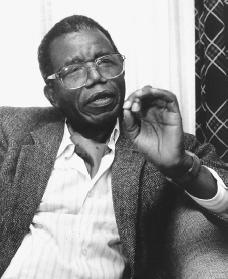
For More Information
Carroll, David. Chinua Achebe. New York: St. Martin's Press, 1980.
Ezenwa-Ohaeto. Chinua Achebe: A Biography. Bloomington: Indiana University Press, 1997.
Innes, C. L. Chinua Achebe. New York: Cambridge University Press, 1990.
User Contributions:
Comment about this article, ask questions, or add new information about this topic:.

BlackPast is dedicated to providing a global audience with reliable and accurate information on the history of African America and of people of African ancestry around the world. We aim to promote greater understanding through this knowledge to generate constructive change in our society.
Chinua achebe (1930-2013).
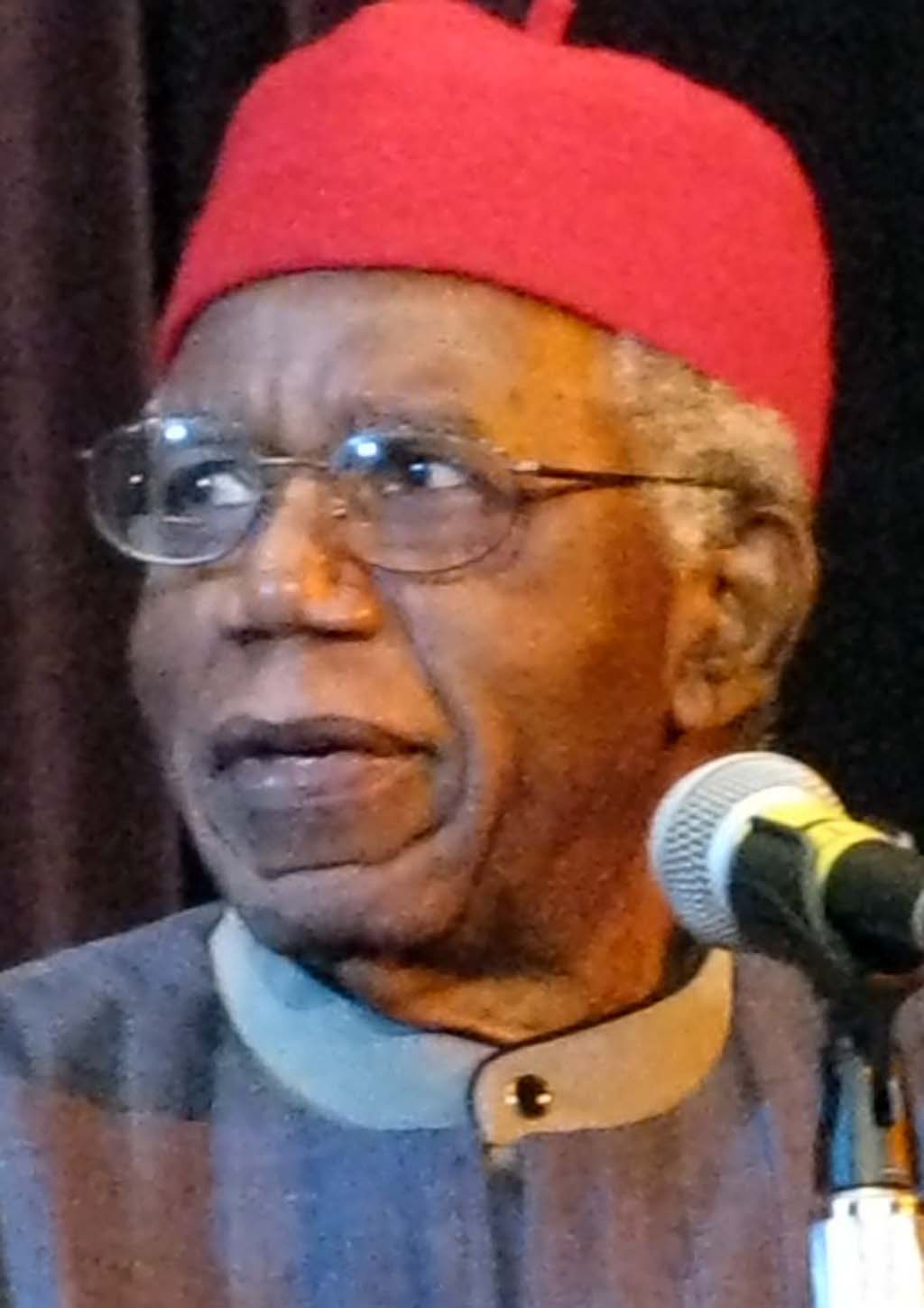
Chinua Achebe of Nigeria was one of the most famous 20th Century African writers . He published his first novel Things Fall Apart in 1958 and has since published four more novels and a series of short stories, essays, and other literature. Much of Achebe’s work focuses on the themes of colonialism, post-colonialism, and the tumultuous political atmosphere in post colonial Nigeria.
Albert Chinualumogu Achebe was born on November 16, 1930 at St. Simon’s Church, Nneobi, Nigeria to a father who was a Christian teacher and missionary . Achebe was very heavily influenced by his native Igbo culture in Eastern Nigeria as well as his father’s desire for all his children to earn their education. Throughout his schooling Achebe was consistently at the top of his class and twice completed two grades within a year. In 1948 Achebe began his university career by attending University College in Ibadan which was affiliated with the University of London ( UK ). While at University College, Chinua Achebe switched his major from Medicine to English and History .
Chinua Achebe graduated in 1954 and left to teach at the Merchant of Light School in Eastern Nigeria. After four months he was offered and accepted a job at the Nigerian Broadcasting Service as the senior broadcasting officer of the Eastern Region. It was during this time that his first novel was published. Achebe also met his future wife, Christie Chinwe Okoli, a co-worker at the Nigerian Broadcasting Service. The two married September 10, 1961.
In October of 1960 Nigeria claimed its independence from Great Britain. Around the same time, Achebe published his second novel, No Longer at Ease . Achebe became the editor for the African Writers Series in 1962 and published his third novel, Arrow of God , in 1964. By that point regional and ethnic tensions began to push Nigeria toward civil war. The 1964 national census was disputed and election results were manipulated. Soon after the disputed census and election, the first two coups in Nigerian history occurred as Army officers deposed the civilian government and then each other. Achebe’s fourth novel, A Man of the People , explored these rapidly evolving developments in Nigerian society
Between 1967 and 1970 Nigeria was convulsed in a civil war as the Igbo people attempted to form their own republic, Biafra . Achebe was active in publicizing this struggle internationally. After the rebellion was crushed, Achebe left Nigeria and became a Professor of English in the United States, first at the University of Massachusetts at Amherst and later at the University of Connecticut at Storrs. Eventually he returned to Nigeria and taught at the University of Nigeria , Nsukka.
In 1987 Achebe published his last novel , Anthills of the Savannah . Three years later he was paralyzed from the waist down in a car accident in Lagos, Nigeria. Chinua Achebe died in Boston on March 22, 2013. He was 82.
Do you find this information helpful? A small donation would help us keep this available to all. Forego a bottle of soda and donate its cost to us for the information you just learned, and feel good about helping to make it available to everyone.
BlackPast.org is a 501(c)(3) non-profit and our EIN is 26-1625373. Your donation is fully tax-deductible.
Cite this entry in APA format:
Source of the author's information:.
C.L. Innes, Chinua Achebe (New York: Cambridge University Press, 1990); Ezenwa-Ohaeto, Chinua Achebe: A Biography (Indianapolis: Indiana University Press, 1997); http://www.bbc.co.uk/bbcfour/documentaries/profile/chinua-achebe.shtml ; http://www.kirjasto.sci.fi/achebe.htm .
Your support is crucial to our mission.
Donate today to help us advance Black history education and foster a more inclusive understanding of our shared cultural heritage.
We will keep fighting for all libraries - stand with us!
Internet Archive Audio

- This Just In
- Grateful Dead
- Old Time Radio
- 78 RPMs and Cylinder Recordings
- Audio Books & Poetry
- Computers, Technology and Science
- Music, Arts & Culture
- News & Public Affairs
- Spirituality & Religion
- Radio News Archive

- Flickr Commons
- Occupy Wall Street Flickr
- NASA Images
- Solar System Collection
- Ames Research Center

- All Software
- Old School Emulation
- MS-DOS Games
- Historical Software
- Classic PC Games
- Software Library
- Kodi Archive and Support File
- Vintage Software
- CD-ROM Software
- CD-ROM Software Library
- Software Sites
- Tucows Software Library
- Shareware CD-ROMs
- Software Capsules Compilation
- CD-ROM Images
- ZX Spectrum
- DOOM Level CD

- Smithsonian Libraries
- FEDLINK (US)
- Lincoln Collection
- American Libraries
- Canadian Libraries
- Universal Library
- Project Gutenberg
- Children's Library
- Biodiversity Heritage Library
- Books by Language
- Additional Collections

- Prelinger Archives
- Democracy Now!
- Occupy Wall Street
- TV NSA Clip Library
- Animation & Cartoons
- Arts & Music
- Computers & Technology
- Cultural & Academic Films
- Ephemeral Films
- Sports Videos
- Videogame Videos
- Youth Media
Search the history of over 866 billion web pages on the Internet.
Mobile Apps
- Wayback Machine (iOS)
- Wayback Machine (Android)
Browser Extensions
Archive-it subscription.
- Explore the Collections
- Build Collections
Save Page Now
Capture a web page as it appears now for use as a trusted citation in the future.
Please enter a valid web address
- Donate Donate icon An illustration of a heart shape
Chinua Achebe : a biography
Bookreader item preview, share or embed this item, flag this item for.
- Graphic Violence
- Explicit Sexual Content
- Hate Speech
- Misinformation/Disinformation
- Marketing/Phishing/Advertising
- Misleading/Inaccurate/Missing Metadata
plus-circle Add Review comment Reviews
510 Previews
5 Favorites
Better World Books
DOWNLOAD OPTIONS
No suitable files to display here.
EPUB and PDF access not available for this item.
IN COLLECTIONS
Uploaded by [email protected] on August 30, 2018
SIMILAR ITEMS (based on metadata)

You are here
Chinua achebe.
Chinua Achebe (1930 – 2013) was an Igbo writer and one of the most important voices in what is now referred to as postcolonial literature. He was born in Ogidi, several kilometres from the Niger River in the south of the territory which would become Nigeria in 1960, upon its independence from the British Empire. His parents were Protestant converts and he spent much of his childhood immersed in their Christian teachings, a background which plays out heavily in depictions of religion in his future writing. An Igbo speaker at home, Achebe started learning English at eight years old.
In 1948, Achebe enrolled at University College (affiliated with the University of London and now known as the University of Ibadan) with a scholarship to read medicine. However, he swiftly changed the subject of his studies to English, losing the scholarship as a result. During this time, Achebe decided to alter his birth name – Albert Chinụalụmọgụ Achebe – as a symbol of resistance against his namesake, the husband of Queen Victoria; or rather, against the empire over which Victoria was sovereign. While studying English literature and reading colonialist narratives, such as Joseph Conrad’s Heart of Darkness (1899) and Joyce Cary’s Mister Johnson (1939), Achebe became increasingly critical of how literature written in the English language had hitherto represented the African continent (including West Africa). He sought to challenge the ways in which literature was complicit in promoting the British Empire through negative stereotypes of colonised and enslaved peoples. Influenced by the small number of Nigerian authors publishing in English, including Amos Tutuola and Wole Soykina who taught at his university, Achebe turned to writing as a means to change how stories about West Africans were being told.
After working for the colonial Nigerian Broadcasting Service (NBC) for several years, Achebe completed his first novel, Things Fall Apart , in 1958, basing the title on a line by the Irish poet W. B. Yeats. Achebe’s manuscript was declined by multiple London publishing houses before eventually being accepted by Heinemann. The publishers reprinted it in 1962 as the very first volume in its African Writers Series (which continued until the 1980s). Set in the nineteenth century, the novel is a poignant tragedy based around a complex and deeply-afflicted protagonist, Okonkwo, who, among other personal issues, struggles with the advent of British imperialism in his Igbo village, Umuofia, which arrived through Christian missionary activity. The novel ends by showing readers a glimpse of an English language report about Umuofia by a British District Commissioner, powerfully symbolising the dangerous ways in which West African settings, peoples, and history have long been inadequately and negatively depicted by ethnographers sympathetic to the British Empire.
The novel has had a monumental impact and it continues to influence writers across the globe. It has been translated into over 50 languages and sold nearly 13 million copies. It inspired Achebe to pen two sequels, No Longer at Ease (1960) and Arrow of God (1964), forming his ‘African Trilogy’ which traces Okonkwo’s descendents across Nigeria’s ever-changing modern history. Achebe has been called the ‘Father of Modern African Literature’. According to Ben Okri, Achebe ‘was a man who answered the questions of his times, the times in which he found himself, in tough, brief, elegant novels and in doing that actually helped to create a language of literature in which many of us came to write in afterwards’.
This connection between literature, history, language, and authenticity is crucial to understanding Achebe’s prose. Indeed, his decision to compose in English was influential, but not without controversy – especially in terms of his important philological debates with the Kenyan writer, Ngũgĩ wa Thiong’o, who had rejected English as his literary language. These very debates have been vital to postcolonial discussions on the role played by specific languages choices when writing postcolonial texts. Moreover, Achebe’s prose is rich with the cadences of Nigerian English and Nigerian Pidgin, and is filled with numerous Igbo words and proverbs, bringing to print a linguistic form which celebrates the speech of people living in Nigeria.
Achebe’s final two novels, A Man of the People (1966) and Anthills of the Savannah (1987), primarily explore corruption in the highest political levels of Nigerian society in the years after its independence. He wrote powerfully against the warfare and imposed famine against Biafra (between 1967 and 1970) during which time many of his peers were imprisoned, including Soyinka, and two million civilians died, many from starvation.
In one of his many published essays, Achebe states that ‘the writer is often faced with two choices – turn away from the reality of life’s intimidating complexity or conquer its mystery by battling with it. The writer who chooses the former soon runs out of energy and produces elegantly tired fiction’. Achebe absolutely never ‘turn[ed] away’ from unpacking and depicting the violent impact of imperialism on Nigeria. He explored the nation’s complicated relationship with religion, language, and literature with great nuance and with compelling attention to the consequence of these issues on the individual. It is for this reason that he is one of the most significant authors of the twentieth century.
If reusing this resource please attribute as follows: Chinua Achebe at http://writersinspire.org/content/chinua-achebe by Daniele Nunziata, licensed as Creative Commons BY-NC-SA (2.0 UK).
Chinua Achebe
Chinua Achebe was born on the 16th of November, in 1930 to Isaiah Okafo Achebe, a servant of the church missionary society, and Janet Anaenechi Iloegbunam. He spent his childhood in Igbo town. The storytelling was part of an ancient tradition in the Igbo society. His mother and sister used to narrate him various stories on Chinua’s request, which helped him develop his interest in literature. His father also had vast literary collection along with with the pictures of colleges hung at their home including, Shakespeare’s literature and ‘The Pilgrim’s Progress’. These influences played a crucial role in his early development toward writing.
Since Chinua belonged to a literate family, his family played a positive role in shaping his literary mind during the early years. First, he attended society’s school, where he began to learn English at the age of eight. At fourteen, he was among the few selected to attend the best government college in Africa . In 1948, he attended University College Ibadan, where he studied medicine, but could not develop an interest in that area. Soon he switched to literature and stunned others with his literary creativity. In 1950, he wrote a literary piece, Polar Undergraduate for University newspaper, Herald, followed by other letters and essays in another magazine, The Bug. After his graduation in 1953, he decided to become a writer and started working in this direction. Also, his teacher, Gilbert Phelps, a literary critic, and novelist, assisted him in his writings.
In 1958, Achebe traveled to Enugu to perform administrative duties. There, he met and developed a relationship with his fellow worker, Christiana Chinwe Okoli. The couple tied the knot on the 10 th of September in 1961 in the chapel of the University of Ibadan. Although they had a peaceful marital relationship, they were worried about the prejudiced view of the world towards African people.
Chinua Achebe, the founding father of African writing, met a fatal accident in Nigeria in 1990. This accident left him paralyzed for the rest of his life. Despite the life-changing incident, he did not give up on life and continued to render his services for literature. This towering figure breathed his last at the age of eighty-two on 21 st March 2013.
Some Important Facts of His Life
- He was awarded thirty honorary degrees from universities of Canada, Scotland, England, Nigeria, and the United States.
- He became the first living writer to have appeared in the Everyman’s Library Collection.
- He won many awards including, The Man Booker International Prize, the Dorothy and Lillian Gish Prize, and the Nigerian National Order of Merit.
Writing Career
Chinua was inspired by the storytelling tradition while growing up, which was combined with traditional events and ceremonies. He started writing as a career at a very young age. His early literary pieces that appeared in his school magazines were the mouthpieces of his literary excellence. He highlighted the collective details of life in Nigeria in contrast with Christian institutions in most of those pieces. Other short stories , including Dead Man’s Path and The Order in Conflict , reflect upon the conflict between modernity and rural traditions. Later, his teacher Gilbert Phelps’s acknowledgment and guide helped him produce his universally acclaimed work, Things Fall Apart , in 1958. Through Things Fall apart , Chinua presented the clash between the white Christian missionaries and native African culture. Later, in his novels, No Longer at Ease, Arrow of God and Man of the People, he documented conflict between African tradition and colonial practices. His other notable works include How the Leopard Got His Claws , Morning Yet on Creation Day and Anthills of the Savannah.
Chinua Achebe stands among the most influential figures of world literature. With the help of his unique writing style , he skillfully wove ancient folktales of the Igbo tribe into his stories. He always highlighted cultural values in those tales. His universally acclaimed novel , Things Fall Apart , is one of the best books in the world. Chinua also used many literary devices in his work to make readers understand the themes and messages through characters and stories. To illustrate the values of Igbo’s oral story tradition, he used proverb in his pieces, such as; The Arrow of God and No Longer at Ease. His writings were marked with irony , metaphors , and humor , as he presented the impact of colonialism on the Nigerian people. Also, he avoided imitating the trends set for English novels. He would alter the sentence syntax , usage, and idiom , into a distinctly African style, which won applause from critics and his fellow writers. The recurring themes in most of his literary pieces are cultural, identity, justice , discrimination, fate, and free will.
Chinua Achebe’s Famous Works
- Novels: He was an outstanding writer some of his best novels are Things Fall Apart , No Longer at Ease, A Man of People, Arrow of God, and Anthills of the Savannah.
- Other Works: Besides novels, he tried his hands on poetry and shorter fiction . Some of them include “Marriage is a Private Affair”, “Dead man’s Path”, “Civil Peace”, “Another Africa” and “Don’t Let Him Die.”
Chinua Achebe’s Impact on Future Literature
Chinua Achebe, with his unique abilities, left a profound impact on global literature. His intellectual ideas, along with distinct literary qualities, won a special place among his readers, critics, and fellow writers. His impact resonates strongly inside as well as outside Africa. Because of his literary services, Chinua was called the father of modern African writing . His masterpieces provide inspiration and principles for the writers of succeeding generations. He also successfully documented his ideas about equality , power , and injustice in his writings. Even today, writers try to imitate his unique style, considering him as an example for writing prose and poetry.
Famous Quotes
- We shall all live. We pray for life, children, a good harvest, and happiness. You will have what is good for you and I will have what is good for me. Let the kite perch and let the egret perch too. If one says no to the other, let his wing break. ( Things Fall Apart )
- i am against people reaping where they have not sown. But we have a saying that if you want to eat a toad you should look for a fat and juicy one. ( No Longer at Ease)
- You must develop the habit of scepticism, not swallow every piece of superstition you are told by witch-doctors and professors. ( Anthills of Savannah)
Related posts:
- Things Fall Apart Characters
- Things Fall Apart Quotes
- Things Fall Apart Themes
- Things Fall Apart
Post navigation

Chinua Achebe: the literary giant who shaped African narrative
- The African History
- September 12, 2023
- Art , Inspirational , Personality Profile
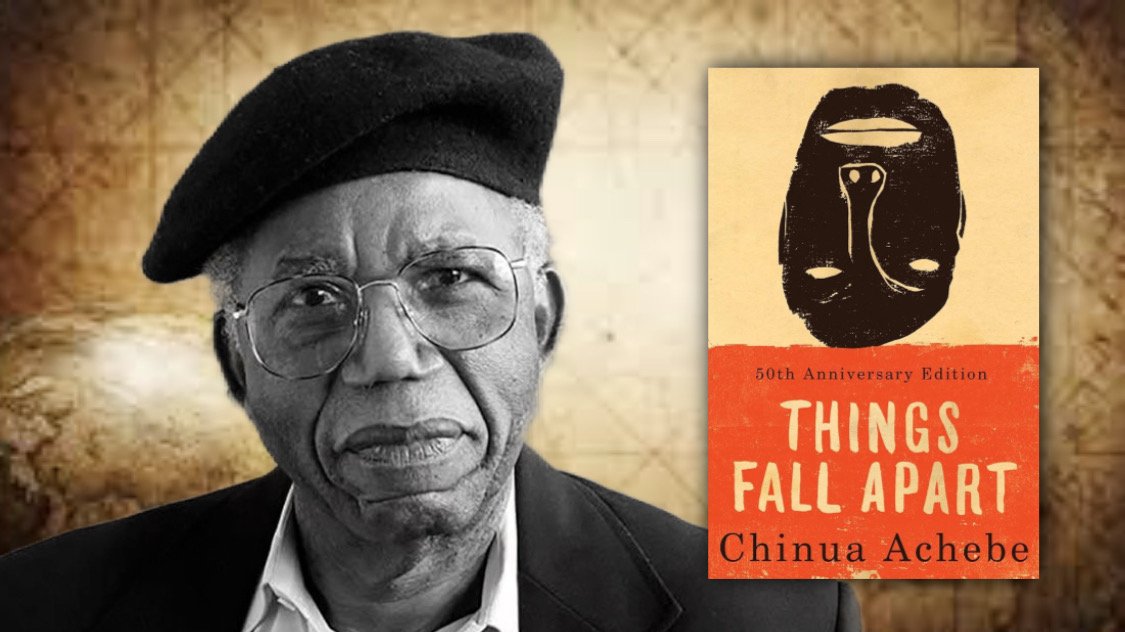
Chinua Achebe, a name synonymous with African literature, stands as a towering figure whose words have resonated across the globe.
Born in Nigeria in 1930, Achebe’s life and works have left an indelible mark on the world of literature. From his groundbreaking novel “Things Fall Apart” to his essays and poetry, Achebe’s contribution to African literature is immeasurable.
This article delves into the life, works, and enduring legacy of Chinua Achebe.
Early Life and Education
Chinua Achebe was born in Ogidi, Nigeria, into the Igbo ethnic group. He was raised in a vibrant cultural milieu, surrounded by traditional Igbo storytelling and rituals. Achebe’s early exposure to his rich African heritage would profoundly influence his later writing.
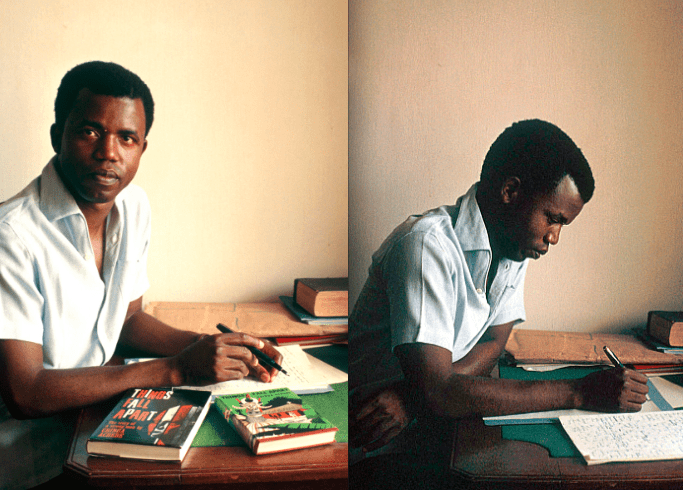
He attended Government College Umuahia and later the University of Ibadan, where he studied English, history, and theology.
Achebe’s education exposed him to both Western and African literary traditions, providing him with a unique perspective that would become a hallmark of his writing.
Literary Breakthrough – “Things Fall Apart”
In 1958, Achebe published his first novel, “Things Fall Apart.” This seminal work is often considered the cornerstone of African literature. Set in pre-colonial Nigeria, the novel vividly portrays the clash between African traditions and the forces of colonialism and Christianity.
Through the life of the protagonist, Okonkwo, Achebe masterfully explores themes of cultural identity, change, and the consequences of colonial oppression.
“Things Fall Apart” was groundbreaking for several reasons. It presented an authentic African perspective, countering the prevailing stereotypes of Africa in Western literature.
Achebe’s use of language was revolutionary, as he wrote the novel in English but infused it with African idioms and proverbs, creating a distinct narrative voice.
Achebe’s Influence on African Literature
Chinua Achebe’s impact on African literature is immeasurable. He opened the door for generations of African writers to tell their own stories and challenge stereotypes.
His work inspired a literary movement known as African literature in English, and he mentored many aspiring writers.
In addition to novels, Achebe wrote essays and criticism, addressing issues of identity, language, and African literature’s role in a post-colonial world.
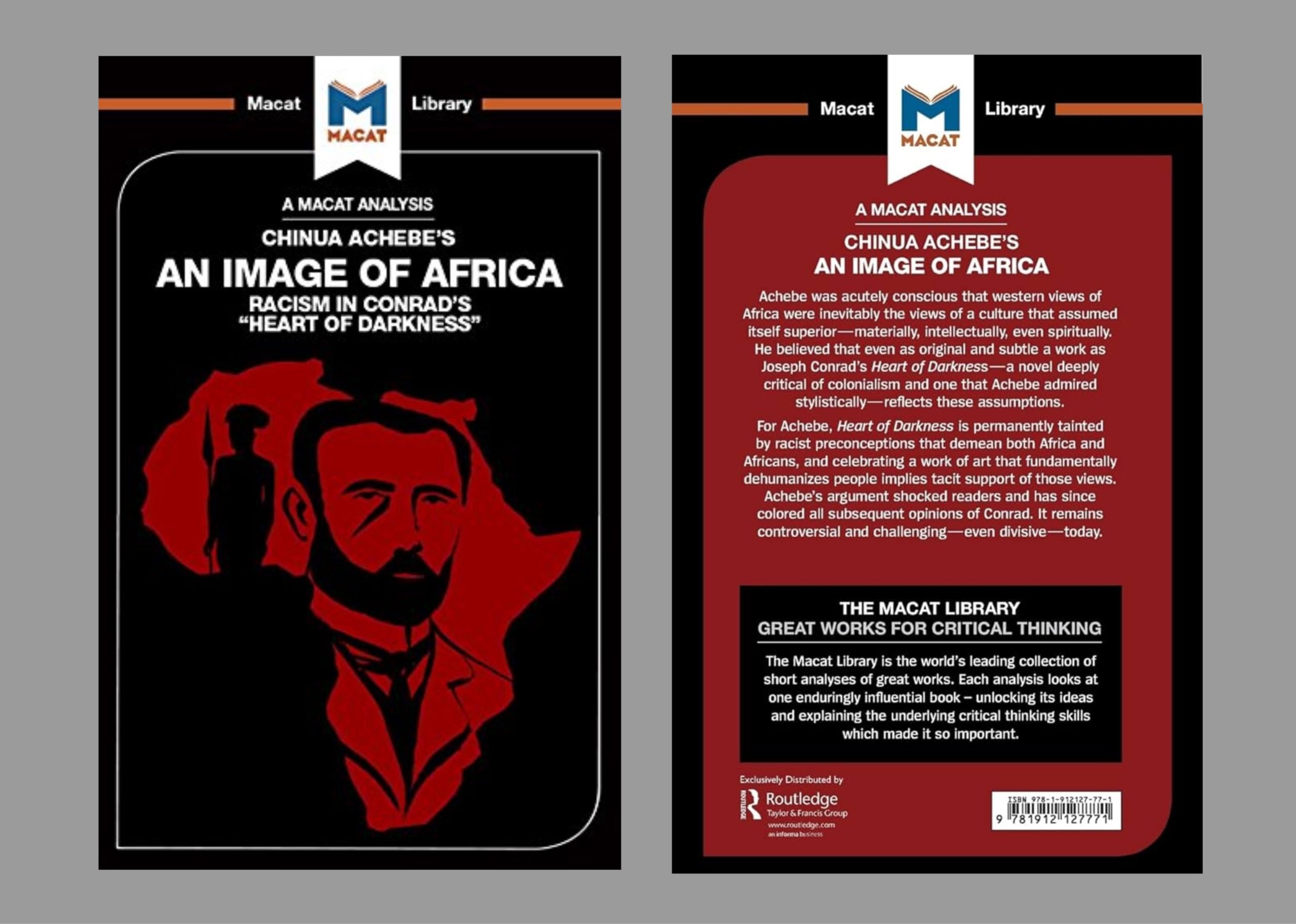
His essay “An Image of Africa: Racism in Conrad’s Heart of Darkness” is a seminal critique of Joseph Conrad’s novel and its portrayal of Africa.
Legacy and Later Works
Chinua Achebe’s literary output extended beyond “Things Fall Apart.” He authored several novels, including “No Longer at Ease,” “Arrow of God,” and “A Man of the People.” These works continued to explore the complexities of African identity and the challenges faced by African societies in a changing world.
In 2007, Achebe published “There Was a Country,” a memoir chronicling his experiences during the Nigerian Civil War. This book provides valuable insights into Achebe’s political views and his deep commitment to his homeland.
Chinua Achebe’s literary legacy endures as a beacon of African storytelling. His ability to blend tradition and modernity, and his unapologetic commitment to African culture, have made his works timeless.
Achebe’s words continue to resonate, inspiring writers and readers alike to explore the rich tapestry of African literature and history.
His contributions to literature and his unrelenting advocacy for African voices have firmly established him as a literary luminary whose influence extends far beyond the pages of his books.
Related posts

- Inspirational
Dreams Unbarred: A Call for Youth Empowerment in Africa
- April 15, 2024

Sadio Mane privately weds longtime girlfriend in simple wedding
- January 8, 2024
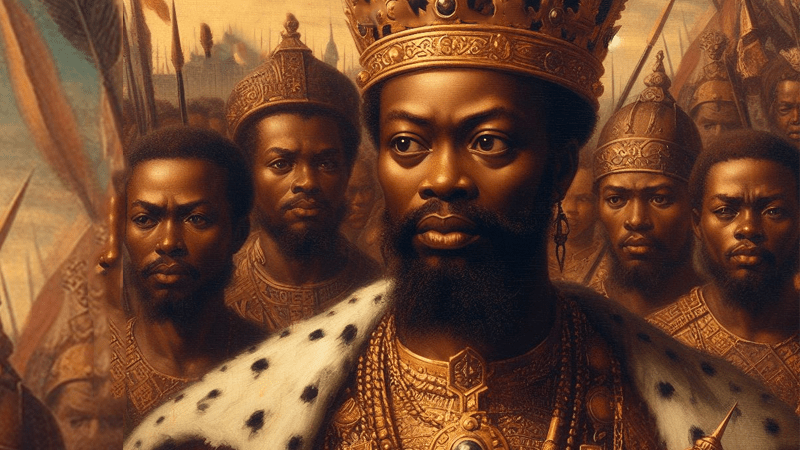
- Ancient Egypt
- Personality Profile
King Afonso I of Kongo, ruler of the Kongolese Kingdom (1509 -1543)
- December 28, 2023

Kilwa Kisiwani: One of the Great Ancient African Cities
- December 13, 2023


Chinua Achebe obituary
Chinua Achebe, who has died aged 82 , was Africa's best-known novelist and the founding father of African fiction. The publication of his first novel, Things Fall Apart , in 1958 not only contested European narratives about Africans but also challenged traditional assumptions about the form and function of the novel. His creation of a hybrid that combined oral and literary modes, and his refashioning of the English language to convey Igbo voices and concepts, established a model and an inspiration for other novelists throughout the African continent.
The five novels and the short stories he published between 1958 and 1987 provide a chronicle of Nigeria's troubled history since the beginning of British colonial rule. They also create a host of vivid characters who seek in varying ways to take control of their history. As founding editor of the influential Heinemann African writers series, he oversaw the publication of more than 100 texts that made good writing by Africans available worldwide in affordable editions.
Born in the traditional Igbo village of Ogidi, eastern Nigeria, some 40 years after missionaries first arrived in the region, Achebe was christened Albert Chinualumogu by his Christian convert parents. Later, in an autobiographical essay entitled Named for Victoria, Queen of England, he told how, like Queen Victoria, he "lost his Albert".
Growing up as a Christian allowed him to observe his world more clearly, he wrote. The slight distance from each culture became "not a separation but a bringing together like the necessary backward step which a judicious viewer might take in order to see a canvas steadily and fully".
At the local missionary school, however, the children were forbidden to speak Igbo, and were encouraged to disown all traditions that might be associated with a "pagan" way of life. Nevertheless, Achebe absorbed the folk tales told to him by his mother and older sister, stories he described as having "the immemorial quality of the sky, and the forests and the rivers".
When he was 14, Achebe was sent to the prestigious colonial Government college at Umuahia, where his schoolmates included the poet Christopher Okigbo, his close friend. In 1948, he won a scholarship to study medicine at what became the University of Ibadan. After his first year, however, he realised it was writing that most appealed to him, and he switched to a degree in English literature, religious studies and history.
Although the English curriculum closely followed Britain's, teachers also introduced works they considered relevant to their Nigerian students, such as Joyce Cary 's African novels and Joseph Conrad's Heart of Darkness. But such works were at odds with the changing mentality brought about by the anti-colonial movements in west Africa following the second world war.
Achebe was among several future literary stars, including Wole Soyinka, who, between 1948 and 1952, contributed stories and essays to student magazines with a nationalist orientation. Even in these early pieces, one can discern Achebe's characteristic qualities: a coolly amused view of the educated elite, a carefully balanced structure of contrasts, a pleasure in mimicking or parodying various modes of discourse, an interest in rural Nigeria and the uneasy interaction between western and Igbo cultures, and an insistence on what he saw as the crucial Igbo value of tolerance. It is in one of these stories that a favourite proverb of his makes its first appearance: "Let the hawk perch and let the eagle perch."
By the time he graduated in 1952, Achebe had decided to be a writer telling the story of Africans and the colonial encounter from an African point of view. One of his motivations was Cary's Nigeria-set novel Mister Johnson, which, though much praised by English critics, seemed to him "a most superficial picture of Nigeria and the Nigerian character". He thought: "If this was famous, then someone ought to try and look at this from the inside."
What had originally been planned as one long novel, beginning with the colonisation of eastern Nigeria and ending just before independence, turned into two shorter novels, Things Fall Apart (set in the late 19th century) and No Longer at Ease (set in the decade before Nigeria gained its independence). While the second novel takes up and retells the plot of Mister Johnson – the story of a young Nigerian clerk who takes a bribe and is tried and sentenced by the colonial administration – the first seeks, with consummate success, to evoke the culture and society Mister Johnson and his ancestors might have come from.
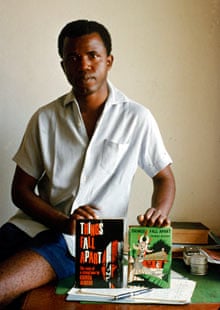
Things Fall Apart recreates an oral culture and a consciousness imbued with an agrarian way of life, and demonstrates, as Achebe put it, "that African peoples did not hear of civilisation for the first time from Europeans". At the same time, he sought to avoid depicting precolonial Africa as a pastoral idyll, rejecting the nostalgic evocations of Léopold Senghor and the francophone négritude school of writing.
The protagonist, Okonkwo, emerges as a heroic but rigid character, whose fear of appearing weak leads him to act harshly towards his wives and children and to participate in the sacrifice of a young hostage from another village. Its characterisation and enclosed rural world have been compared to The Mayor of Casterbridge by Thomas Hardy, a novelist Achebe admired. Things Fall Apart has sold millions of copies and has been translated into more than 50 languages.
No Longer at Ease, set in 1950s Nigeria and published in 1960, takes up the story of Okonkwo's grandson, an idealistic young Nigerian civil servant who returns home after studying in England, finds his salary inadequate for his expected lifestyle, and takes a bribe.
By this time, Achebe himself had been on the first of many trips abroad. As head of the talks department at the Nigerian Broadcasting Service (NBS), he was sent in 1956 on a short training course with the BBC in London. Back in Nigeria, he edited and produced discussion programmes and short stories for the NBS in Enugu, eastern Nigeria, and learned much about how good dialogue works. There, he met Christie Chinwe Okoli, a beautiful and brilliant student from Ibadan University. They married in 1961 and had four children.
While preparing a feature on the response of Nigerians to early colonial rule, Achebe investigated the story of an Igbo priest imprisoned for refusing to collaborate with the British. Fascinated by the tale and the priest's proud character, he made it the focus of his third novel, Arrow of God (1964). Some critics regard this as Achebe's greatest achievement, with its complex structure and characterisation, and its interrogation of the interstices between subjective desire and external forces in the making of history.
The concerns with responsible leadership that inform Arrow of God are taken up more explicitly in his satirical fourth novel, A Man of the People (1966). It exposes the corruption and irresponsibility of politicians and their constituents, ending with a military coup – as indeed happened in post-independence Nigeria in 1966, a coup that led to the attempted secession of Biafra and a civil war in which more than a million people died.
When the massacre of Igbos began in the north following the coup, Achebe was working for the Nigerian Broadcasting Commission in Lagos. Warned that he might be in danger (a cousin was one of the military leaders assassinated), Achebe took his family to eastern Nigeria. He became a strong advocate of Biafra's independence, travelling the world to seek support. In his view, Biafra was not only a territory that could ensure the survival of Igbo peoples, but also an ideal. Speaking in 1968, he declared: "Biafra stands for true independence in Africa, for an end to the 400 years of shame and humiliation which we have suffered in our association with Europe … I believe our cause is right and just. And this is what literature should be about today – right and just causes."
Although the war ended in defeat for the Biafran cause, Achebe was determined the Igbo presence and perspectives should continue within the Nigerian nation. His collection of poems Beware Soul Brother (1971) and the volume of short stories Girls at War and Other Stories (1972) drew on the experiences of the war. He became a senior research fellow at the University of Nigeria, Nsukka, and in 1971 he and a group of Nigerian academics founded Okike, an important journal for African creative writing and critical debate. He also wrote several books for children.
In 1972, Achebe accepted a visiting professorship at the University of Massachusetts Amherst, where he taught African literature and continued to edit Okike. It was there that I first met him and worked as an assistant editor for Okike. I also attended and occasionally co-taught his course on African writing, and admired his patience with students who sometimes made all too evident their ignorance and prejudice with regard to African culture.
That tolerance, and indeed friendship, extended to colleagues such as a professor who jokingly promised to provide native girls for all the members of his department when he became head. I looked across at Achebe and saw him raise an eyebrow. Despite his passionate condemnation of racism and imperial arrogance, it is Achebe's gentle irony, ready laughter and his delight in anecdotes about our children's antics that I most vividly remember.
He did not retreat from controversy. In essays, lectures and interviews, he declared the need for committed writing in the African context, and derided writers and critics whose attitudes to Africans he found condescending or racist. At the University of Massachusetts, he denounced Heart of Darkness in a lecture that caused many in the audience to walk out in protest, and still arouses debate.
Achebe returned to Nigeria in 1976 to be professor of literature at the University of Nigeria, where he continued to teach, became chairman of the Association of Nigerian Writers and edited Uwa ndi Igbo, the Journal of Igbo Life and Culture. He was also elected deputy national president of the People's Redemption party and published a political pamphlet, The Trouble With Nigeria, in 1983.
Achebe not only created a new kind of novel, but was also unwilling to repeat the same formula. Each novel set up a dialogue with its predecessor, technically and formally as well as with regard to character and social milieu. This process culminated in his fifth novel, Anthills of the Savannah (1987), which commented on the forms and themes of his own works and those of other African writers. The novel insists there is no one story of the nation, but a multiplicity of narratives, weaving continuities between past and present, Igbo and English cultural forms and traditions. The philosophy, structure and aesthetic of Anthills of the Savannah, and indeed of all of Achebe's fiction, is summarised in the final sentences of his essay The Truth of Fiction: "Imaginative literature … does not enslave; it liberates the mind of man. Its truth is not like the canons of orthodoxy or the irrationality of prejudice and superstition. It begins as an adventure in self-discovery and ends in wisdom and humane conscience."
In 1990, a car accident left Achebe paralysed. Bard College, New York, offered him and Christie the possibility of teaching there and provided the facilities he needed. Now using a wheelchair, he continued to travel and lecture in the US and occasionally abroad. His talks at Harvard in 1998 were published under the title Home and Exile.
His more recent lectures and autobiographical essays were published in The Education of a British-Protected Child (2009). He moved to Providence, Rhode Island, in 2009 after being appointed professor of Africana studies at Brown University. In 2012 he published There Was a Country: A Personal History of Biafra, which reiterated his belief in the ideals that had inspired the nationalism of his younger days. His account of the events that led to the civil war, its conduct and aftermath have stirred strong reactions from supporters as well as opponents of the Biafran cause.
Achebe received numerous awards and more than 30 honorary doctorates, but among the tributes he may have valued most was Nelson Mandela's. "There was a writer named Chinua Achebe ," Mandela wrote, "in whose company the prison walls fell down."
He is survived by Christie, their daughters, Chinelo and Nwando, and their sons, Ikechukwu and Chidi.
- Chinua Achebe
- Higher education

Chinua Achebe funeral celebrates revered Nigerian author

Novelist Chinua Achebe dies, aged 82

Calls for Chinua Achebe Nobel prize 'obscene', says Wole Soyinka

Nigeria in mourning for Chinua Achebe

Chinua Achebe peered deep into the Nigerian psyche

Chinua Achebe: leader of a generation

Chinua Achebe, Nigerian novelist and poet - in pictures

Chinua Achebe's anti-colonial novels are still relevant today

Chinua Achebe: A life in writing

The great Chinua Achebe was the man who gave Africa a voice
Most viewed.
- Share full article
Advertisement
Supported by
Chinua Achebe, African Literary Titan, Dies at 82

By Jonathan Kandell
- March 22, 2013
Chinua Achebe, the Nigerian author and towering man of letters whose internationally acclaimed fiction helped to revive African literature and to rewrite the story of a continent that had long been told by Western voices, died on Thursday in Boston. He was 82.
His agent in London said he had died after a brief illness. Mr. Achebe had used a wheelchair since a car accident in Nigeria in 1990 left him paralyzed from the waist down.
Chinua Achebe (pronounced CHIN-you-ah Ah-CHAY-bay) caught the world’s attention with his first novel, “Things Fall Apart.” Published in 1958, when he was 28, the book would become a classic of world literature and required reading for students, selling more than 10 million copies in 45 languages.
The story, a brisk 215 pages, was inspired by the history of his own family, part of the Ibo nation of southeastern Nigeria, a people victimized by the racism of British colonial administrators and then by the brutality of military dictators from other Nigerian ethnic groups.
“Things Fall Apart” gave expression to Mr. Achebe’s first stirrings of anti-colonialism and a desire to use literature as a weapon against Western biases. As if to sharpen it with irony, he borrowed from the Western canon itself in using as its title a line from Yeats’s apocalyptic poem “The Second Coming.”
“In the end, I began to understand,” Mr. Achebe later wrote. “There is such a thing as absolute power over narrative. Those who secure this privilege for themselves can arrange stories about others pretty much where, and as, they like.”
Though Mr. Achebe spent his later decades teaching at American universities, most recently at Brown, his writings — novels, stories, poems, essays and memoirs — were almost invariably rooted in the countryside and cities of his native Nigeria. His most memorable fictional characters were buffeted and bewildered by the competing pulls of traditional African culture and invasive Western values.
“Things Fall Apart,” which is set in the late 19th century, tells the story of Okonkwo, who rises from poverty to become a wealthy farmer and Ibo village leader. British colonial rule throws his life into turmoil, and in the end, unable to adapt, he explodes in frustration, killing an African in the employ of the British and then committing suicide.
The acclaim for “Things Fall Apart” was not unanimous. Some British critics thought it idealized precolonial African culture at the expense of the former empire.
“An offended and highly critical English reviewer in a London Sunday paper titled her piece cleverly, I must admit, ‘Hurray to Mere Anarchy!’ ” Mr. Achebe wrote in “ Home and Exile ,” a 2000 collection of autobiographical essays. Some critics found his early novels to be stronger on ideology than on narrative interest. But his stature grew, until he was considered a literary and political beacon , influencing generations of African writers as well as many in the West.
“It would be impossible to say how ‘Things Fall Apart’ influenced African writing,” the Princeton scholarKwame Anthony Appiah once wrote. “It would be like asking how Shakespeare influenced English writers or Pushkin influenced Russians.”
Mr. Appiah, a professor of philosophy, found an “intense moral energy” in Mr. Achebe’s work, adding that it “captures the sense of threat and loss that must have faced many Africans as empire invaded and disrupted their lives.”
Nadine Gordimer, the South African novelist and Nobel laureate, hailed Mr. Achebe in a review in The New York Times in 1988, calling him “a novelist who makes you laugh and then catch your breath in horror — a writer who has no illusions but is not disillusioned.”
Mr. Achebe’s political thinking evolved from blaming colonial rule for Africa’s woes to frank criticism of African rulers and the African citizens who tolerated their corruption and violence. Indeed, it was Nigeria’s civil war in the 1960s and then its military dictatorship in the 1980s and ‘90s that forced Mr. Achebe abroad.
In his writing and teaching Mr. Achebe sought to reclaim the continent from Western literature, which he felt had reduced it to an alien, barbaric and frightening land devoid of its own art and culture. He took particular exception to"Heart of Darkness,"the novel byJoseph Conrad, whom he thought “a thoroughgoing racist.”
Conrad relegated “Africa to the role of props for the breakup of one petty European mind,” Mr. Achebe argued in his essay “ An Image of Africa .”
“I grew up among very eloquent elders,” he said in an interview with The Associated Press in 2008. “In the village, or even in the church, which my father made sure we attended, there were eloquent speakers.” That eloquence was not reflected in Western books about Africa, he said, but he understood the challenge in trying to rectify the portrayal.
“You know that it’s going to be a battle to turn it around, to say to people, ‘That’s not the way my people respond in this situation, by unintelligible grunts, and so on; they would speak,’ ” Mr. Achebe said. “And it is that speech that I knew I wanted to be written down.”
Albert Chinualumogu Achebe was born on Nov. 16, 1930, in Ogidi, an Ibo village. His father became a Christian and worked for a missionary teacher in various parts of Nigeria before returning to the village. As a student, Mr. Achebe immersed himself in Western literature. At the University College of Ibadan, whose professors were Europeans, he read Shakespeare, Milton, Defoe, Swift, Wordsworth, Coleridge, Keats and Tennyson. But the turning point in his education was the required reading of"Mister Johnson,"a 1939 novel set in Nigeria and written by an Anglo-Irishman, Joyce Cary.
The protagonist is a docile Nigerian whose British master ultimately shoots and kills him. Like reviewers in the Western press, Mr. Achebe’s white professors praised it as one of the best novels ever written about Africa. But Mr. Achebe and his classmates responded with “exasperation at this bumbling idiot of a character,” he wrote.
He soon joined a generation of West African writers who in the 1950s were coming to the realization that Western literature was holding the continent captive. A fellow Nigerian, Amos Tutuola, opened the floodgates with his 1952 novel, “The Palm-Wine Drinkard.”
After graduating from college in 1953, Mr. Achebe moved to London, where he worked for the British Broadcasting Corporation while writing stories. It was in London that he wrote “Things Fall Apart,” in longhand.
After returning to Nigeria to revise the manuscript, he mailed it — the only existing copy — to a London typing service, which promptly misplaced it, filling Mr. Achebe with despair. It was discovered only months later.
Publishers initially passed on the manuscript, doubting that African fiction would sell, until an adviser at the Heinemann publishing house seized on it as a work of brilliance.
In his second novel, “ No Longer at Ease ,” in 1960, he tells the story of Okonkwo’s grandson, Obi, who learns to fit into British colonial society. Raised as a Christian and educated in England, Obi abandons the countryside for a job as a civil servant in Lagos, which was the capital at the time. Cut off from traditional values, he succumbs to greed and in the end is prosecuted for graft.
In his third novel, “Arrow of God” (1964), Mr. Achebe reverts to the setting of an Ibo village in the early 20th century. The village priest, Ezeulu, sends his son, Oduche, to be educated by Christian missionaries in the hope that he will learn British ways and thus help protect his community. Instead Oduche becomes a convert to colonialism and attacks Ibo religion and culture.
The Nigerian civil war, also known as the Biafran war, shattered Mr. Achebe’s hopes for a more promising postcolonial future, and deeply affected his literary output. The scene was set for war when, in January 1966, Ibo army officers killed the prime minister and other officials and seized power. Seven months later, the insurgents were ousted in a counter-coup by military commanders from the Muslim northern region.
Before the year ended, Muslim troops had massacred some 30,000 Ibo people living in the north. In 1967 the Ibo then seceded from Nigeria, declaring the southeastern region the independent Republic of Biafra, and the civil war began in earnest, raging through 1970 until government troops invaded and crushed the secessionists.
Mr. Achebe’s fourth novel, “A Man of the People,” published in early 1966, had predicted this course of events with such accuracy that the military government in Lagos decided he must have been a conspirator in the first coup, an accusation he denied. Mr. Achebe fled, settling in Britain with his wife, Christiana; their two sons, Ikechukwu and Chidi; and two daughters, Chinelo and Nwando. (Information about his survivors was not immediately available.)
After the civil war, Mr. Achebe returned to Nigeria for two years before accepting faculty posts in the 1970s at the University of Massachusetts and the University of Connecticut. He returned home again in 1979 to teach English at the University of Nigeria.
The civil war was the theme of many of his writings during these years. Among the most prominent were a book of poetry, “ Beware Soul Brother ” (1971), which won the Commonwealth Poetry Prize, and a short-story collection,"Girls at War,” which appeared in 1972.
But for more than 20 years a case of writer’s block kept him from producing another novel. He attributed the dry spell to emotional trauma that had lingered after the civil war.
“The novel seemed like a frivolous thing to be doing,” he told The Washington Post in 1988.
That year Mr. Achebe finally published his fifth novel, “Anthills of the Savannah,” the story of three former school chums in a fictional country modeled after Nigeria. One of them becomes a military dictator; another is appointed minister of information; and the third is named editor of the leading newspaper. All meet violent ends.
The novel was widely admired. Discussing it in 1988 in The New York Review of Books, the Scottish journalist Neal Ascherson wrote: “Chinua Achebe says, with implacable honesty, that Africa itself is to blame, and that there is no safety in excuses that place the fault in the colonial past or in the commercial and political manipulations of the First World.”
Mr. Achebe barely had time to savor the acclaim before the car accident outside Lagos that injured him. He received medical treatment in London and moved to the United States, taking a teaching post at Bard College in the Hudson River valley, where he remained until 2009. He received the Man Booker International Prize for lifetime achievement in 2007. Last fall he published “There Was a Country: A Personal History of Biafra.”
The return of civilian, democratic rule to Nigeria in 1999 prompted Mr. Achebe to visit for the first time in almost a decade. He met the newly elected president,Olusegun Obasanjo, and cautiously praised him as the best possible leader “at this time.” He also traveled to his native village, Ogidi.
Mr. Achebe returned to the United States, but his heart remained in his homeland, he said.
“People have sometimes asked me if I have thought of writing a novel about America, since I have now been living here some years,” Mr. Achebe wrote in “Home and Exile.” His answer was “that America has enough novelists writing about her, and Nigeria too few.”
An earlier version of this obituary misspelled the last name of another Nigerian author. He is Cyprian Ekwensi, not Ekwendi. It also misstated the title of a novel by Amos Tutuola. It is “The Palm Wine Drinkard,” not “The Palm Wine Drunkard.” It also misstated the location of the University of Nigeria, where Mr. Achebe taught. It is in Nsukka, not Lagos.
How we handle corrections
(92) 336 3216666
Chinua Achebe
Chinualumogu Albert Achebe is an eminent Nigerian writer. He is normally viewed as the father of Afro-English writing. He was born in 1930 in Ogidi, Nigeria, and raised by Christian guardians. , Chinua Achebe is a Christian who has removed himself from the nearby customs and culture of his kin. Regardless of his Western training and vocation as a writing educator in the United States, Chinua Achebe regarded the Igbo culture.
Throughout the years, Chinua Achebe has functioned as a writer, artist, editorial manager and producer, Professor, political lobbyist, and writer of numerous scholarly works. His works are generally well known over the globe and have been utilized in showing writing in foundations of higher learning and secondary schools.
The artistic works of Chinua Achebe essentially rotate around issues contacting straightforwardly or in a roundabout way on social customs, impacts of colonization, and inside clashes existing among contemporary Africans. The mix of these and other related components makes it for all intents and purposes inconceivable for readers to have a comprehension of such components. Achebe joins components from the Igbo society in his compositions in order to empower his crowds to get away from the subject substance.
A Short Biography of Chinua Achebe
Chinua Achebe was a Nigerian professor, novelist, critic, and poet. He was born on November 16, 1930. He was born in the Igbo town of Ogidi. This town is located in the southern part of Nigeria. His father was Isaiah Okafa Achebe while his mother was Janet Anaenechi Iloegbunam. His parents stopped following their ancestral religion and converted to Christianity. The Achebe family had many children but six of them survived. Alongside Chinua Achebe, they were Frank Okwuofu, John Chukweumeka Ifeanyichukwu, Zinobia Uzoma, Augistine Ndubisi and Grace Nwanneka.
His parents had converted from their religion to Christianity so this had a great impact on the naming traditions and lives of their children as well. Chinua Achebe was born as Albert Chinualumogu Achebe. So this name became Chinua Achebe. They lived in Ogidi. Storytelling was an important tradition in Igbo families. Chinua Achebe got all the traditional stories in his childhood from his mother and sisters.
Chinua Achebe joined St Phillips` Central School in 1936 when he was six years old. He was an extraordinary student. He was forced to stay in the class of religion for young children but was moved quickly to the higher class. The teachers appreciated him a lot and he was called to be the student with best writing skills and handwriting.
Chinua Achebe joined the University College in 1948. It is now the University of Ibadan. At that time, it was an affiliated college of the University of London. He was given a financial scholarship to study medicine at the University. During his studies at the university, he became corrosively critical towards the European literature about Africa.
The character of a Nigerian man depicted wrongly in Mister Johnson by Joyce Cary in 1939, disturbed him to a great extent. This book described Nigerians as savage people. Thus he decided to become a writer and tried to eradicate the narrative developed against his own people.
After making his decision, he quit medicine study and took History, English, and theology as his major subjects. This resulted in his losing the scholarship. The Art Department of the University was a very strong and devoted teacher who were famous writers as well. This resulted in the development of Achebe as a writer.
He started his writing career in 1950 when he wrote ‘Polar Undergraduate’ for the University Herald. Afterwards, he wrote a few more essays and they got published in the campus magazine, The Bug. He also served as the editor of Herald in 1951-1952 sessions.
While at the college, Achebe composed his first short story, “In a Village Church”, which consolidates subtleties of life in Nigeria with Christian organizations and symbols. He also featured this style of writing in a considerable lot of his later works.
Other short stories he composed during his time at Ibadan like “The Old Order in Conflict with the New” and “Dead Men’s Path” analyze clashes among convention and advancement. When a teacher named Geoffrey Parrinder showed up at the college to teach comparative religion, Achebe started to investigate the fields of Christian history and African customary religions.
He took his final university exam of Ibadan in 1953. After the results, he got a second-class degree. This baffled him because he was uncertain about his future. Thus, he came back to his town Ogidi to ponder about his future.
Chinua Achebe was unable to come to a conclusion for the selection of his future path. A friend visited him and persuaded him that there is a vacancy of an English teacher at the Merchants of Light School at Oba and that Achebe must apply for it. He applied and got the job. The school was not a good school in regard to its infrastructure and resources. It was built on the bad bush.
He worked hard with the student and made available the newspaper for his students to read it. He wanted them to read extensively. He taught in the school for almost four months. In 1954, he applied for a post at the Nigerian Broadcasting Service. When he got the job he got shifted to Lagos.
The National Broadcasting service was started by the colonial government in 1933. When Achebe got the job he was assigned the role in the Talks Department. His duty was to write the scripts for voice delivery. This enabled him to excel in writing skills which proved very beneficial for him later in his writing career.
It is while staying in Lagos; he started working on his first novel. Before him, very little was written for African Literature in English yet Achebe decided to write in English and developed a style of his own. In 1956, Queen Elizabeth II visited Nigeria. This visit brought about the perspectives of colonialism and disguised politics and this moved Achebe to a greater extent.
In 1956, Achebe got selected by the British Broadcasting Corporation for its Staff School. He was then sent abroad for technical production skills to London. In London, he got a chance to meet the novelist Gilbert Phelps. Achebe presented his manuscript and he wanted to show it to his editor. Achebe excused and said he wanted to improve the script.
He returned to Nigeria and restructured his novel. After completion, he sent the copy to the London Company. The company did not respond to the copy. Achebe`s broadcasting service boss was visiting England and Achebe requested her to see the prospect of the manuscript. She intervened and the company sent Achebe a typed copy of the novel.
Afterwards, the novel was sent to many of the publishers but most of them rejected it on the grounds that the Nigerian writers are not read by the readers. The publisher Heinemann decided to publish it on the advice of Donald McRae who had recently visited West Africa.
On 17th June 1958 Heinemann published two thousand copies of the novel with the title of Things Fall Apart. The book was received very warmly by the readers, critics, and press. Back in Nigeria, the reception was a sort of mix because people did not think that a Nigerian Native writer could produce a reading worthy book in English. Soon the book became an important part of African Literature and sold over 20 million copies around the world. this novel got translated into 57 languages.
In 1958, Achebe was promoted to take over the post of in-charge for the eastern region coverage of the broadcasting network. He shifted to Enugu. Achebe met a lady Christiana Chinwe working in NBS. She was an underrated employee and was not given a good salary. She was in the hospital for an appendectomy. Achebe visited her with gifts.
This marked the starting point of a connection between the two. They got married in 1961. In 1962, their first daughter Chinelo got born. Afterwards, they had two sons Ikechukwu in 1964 and Chidi in 1967. In 1970, another daughter of Achebe was born and she was named Nwando.
In 1960, Achebe came up with his second novel, No Longer at Ease. He dedicated his second novel to his wife Christiana. The novel reflected the various hardships and challenges about the independence of Nigeria.
In 1960, he was honored with a Rockefeller Fellowship for six months traveling trip. He visited Kenya, and Tanzania where he was shocked because the immigration form did not mention his own nationality and ethnicity.
His third novel, Arrow of God was published in 1964. In 1966, he published his fourth novel A Man of the People.
In 1967, the eastern part of Nigeria separated itself from Nigeria and announced itself as the Republic of Biafra. This made the country go into the state of war. Achebe was forced to move into Biafra. His house was destroyed by bombing. During this period, Achebe wrote short and intense poetry. In 1970, the state of Biafra surrendered to Nigeria, and Achebe returned to his hometown. He got a job at the University of Nigeria in Nsukka. Because he supported the state of Biafra so his passport was revoked by the government.
The University of Massachusetts Amherst offered Achebe the role of a professor in 1972 and he moved along with his family to the United States.
In 1975, he was awarded by the University of Stirling with an honorary degree of doctorate. He was also awarded the Lotus Prize for Afro-Asian Writer. He returned to Nigeria in 1976 and started working at the University of Nigeria. He retired in 1982. He published his fifth novel Anthills of the Savannah in 1987. In 1990, he met with an accident and his lower part paralyzed completely. In 2013, he died in Boston.
Chinua Achebe’s Writing Style
Oral tradition.
The style of Achebe’s fiction draws vigorously on the oral custom of the Igbo people. He meshes society stories into the texture of his accounts. The story about the Earth and Sky in Things Fall Apart, for instance, accentuates the interdependence of masculinity and femininity. Despite the fact that Nwoye appreciates hearing his mother tell the story, Okonkwo’s abhorrence for it is proof of his imbalance. Later, Nwoye maintains a strategic distance from beatings from his father by claiming to aversion such ladies’ stories.
Achebe’s short stories are not as generally concentrated as his books, and Achebe himself didn’t think of them as a significant piece of his work. In the introduction for Girls at War and Other Stories, he states that twelve pieces in twenty years must be an entirely lean reap by any reckoning. Like his books, the short stories are intensely affected by the oral convention. Also, similar to the folktales they follow, the accounts frequently have ethics stressing the significance of social traditions.
Use of Proverbs
Another sign of Achebe’s style is the utilization of proverbs, which regularly represent the estimations of the rustic Igbo convention. He sprinkles them all through the stories. Critic Anjali Gera noticed that the utilization of proverbs in ‘’Arrow of God’’ serves to make an echo impact on the judgment of a network upon an individual violation. The utilization of such reiteration in Achebe’s urban books, No Longer at Ease and A Man of the People, is less pronounced.
For Achebe proverbs and society, stories are not the whole of the oral Igbo convention. In consolidating philosophical ideas and open execution into the utilization of rhetoric, his characters display what he called a matter of individual greatness of some portion of Igbo culture. In Things Fall Apart, Okonkwo’s companion Obierika voices the most energetic speech, taking the shape of the occasions and their noteworthiness for the town. Nwaka in Arrow of God likewise displays dominance of rhetoric, but for pernicious ends.
Achebe often incorporates folk songs and depictions of dancing in his work. Obi, the hero of No Longer at Ease, is at one point met by ladies singing a “Melody of the Heart”, which Achebe gives in both Igbo and English, “Is everybody here?”. In Things Fall Apart, dancing and the singing of people tunes mirror the real factors of Igbo custom.
The old Uchendu, endeavoring to shake Okonkwo out of his self-centeredness, alludes to a song sung after the demise of a lady: For whom is it well, for whom is it well? There is nobody for whom it is well. This song appears differently in relation to the gay and romping tunes of evangelism sung later by the white missionaries.
Use of English
As the decolonization unfurled during the 1950s, a discussion about the decision of language emitted and sought after around the globe. Achebe was no special case. In reality, he discovered his books and choices questioned with outrageous examination especially as to his utilization of English. One way of thinking, advocated by Kenyan essayist Ngũgĩ wa Thiong’o, encouraged the utilization of indigenous African dialects. He said English and other European dialects were a piece of the neo-colonial structures that quell dynamic ideas.
Achebe decided to write in English. In his paper “The African Writer and the English Language”, he examines how the procedure of imperialism gave colonized individuals from shifting phonetic foundations a language with which to converse with each other. As his motivation is to speak with readers across Nigeria, he utilizes the one focal language to communicate across the country. Using English permitted his books to be perused in the states of colonizer masters as well.
In any case, Achebe perceives the inadequacies of what Audre Lorde called the tools of masters. In another paper he notes that for African writing in English isn’t without its genuine mishaps. He frequently winds up depicting circumstances or methods of thought which have no immediate identity in the English lifestyle. Trapped in that circumstance he can do one of two things.
He can attempt to contain what he needs to state inside the restrictions of customary English or he can attempt to push back those cutoff points to oblige his thoughts. He says that he can present the individuals who can accomplish crafted by expanding the boondocks of English in order to oblige African ideas. It is done through their authority of English and not out of innocence.
In another article, he alludes to James Baldwin’s battle to utilize the English language to precisely speak to his experience. He also stated his acknowledgment that he expected to assume responsibility for the language and extend it. The Nigerian artist and author Gabriel Okara compares the procedure of language-extension to the development of jazz music in the United States.
Achebe’s books laid an imposing basis for this procedure. By modifying linguistic structure, use, and figure of speech, he changes the language into a particularly African style. In certain spots this appears as the reiteration of an Igbo thought in Standard English speech. In some places it shows up as account asides incorporated into engaging sentences.
Simple Diction
In his novel, Achebe utilizes direct language and straightforward sentence structures. His style makes a feeling of convention befitting a verifiable story told from a third-individual omniscient perspective. In keeping his language direct and to the point, Achebe contributes his composition with the sentiment of nonpartisan reportage.
In spite of the fact that non-Igbo readers may feel difficulty over the new names, the sentences don’t present specific trouble regarding punctuation or jargon. The sentences do not contain pointless embellishments. Achebe utilizes basic action words, with little variety. His propensity to depend on types of action words to be unobtrusive underscores the feeling of verifiable authenticity. He also urges the readers to put stock in the Igbo social world portrayed in his works.
Use of Images
Another sign of Achebe’s style is the utilization of images and pictures. Through his utilization of pictures and images, Achebe passes on more profound implications. He needs to cause the readers to comprehend his fundamental importance covered up in the novel. For example, the image of anthills dwelling places in the savannah unwinds the code of the novel.
It is an image of protection from the hard and insufferable conditions that individuals live in the nation of Kangan under the autocracy of Sam Okoli. The anthills are representative of endurance and prefigure Beatrice, the significant character who survives as an onlooker of the shameful acts and the hard encounters of the past.
She will be a part of the individuals who will describe the exercise to the people in the future as Ikem places it in this sentence like an enigma. The job that Ikem plays in the novel is critical. Regarding style, he is the person who renders the novel graceful. Achebe utilizes Ikem shrewdly to give his books various styles by separating the sorts of storytellers and characters.
Major Themes
Cultural and tradition.
In the vast majority of his scholarly works, Chinua Achebe makes endeavors to outline the communications of African culture. In this case he inculcates the Nigerian Igbo and innovation as an impact of British colonization of Nigeria. In his first novel, the presentation of Christian culture in Umuofia is met by sharp obstruction and restriction by local people who endeavor to guard their nearby legacy..
In this novel the jobs made by the District Commissioner are deciphered by local people as a method of securing them out significant dynamic procedures of issues influencing the network. This in actuality goes about as a springboard for their resistance to European intrusion. The obstruction of neighborhood conventions by European culture is also portrayed in the novel, Anthills of the Savannah.
The character, Sam Okoli is a commonplace case of a Western instructed person who detests his local customs. This makes it hard for him to viably assume the job relegated to him by the author, for example the leader of Kangan.
Gender Roles
The way wherein Chinua Achebe assigns jobs to characters in his books brings into thought the individual jobs of the two people, as to the standards and desires for the general public. Following his origin to patriarchal Igbo people where significant family choices are made by the paterfamilias. Chinua attempts to fuse these cultural components in his works.
Igbo men were polygamous in nature and were permitted to thrash their spouses if there were an occurrence of any local misconceptions. This is most likely why he portrays Okonkwo in Things Fall Apart as a man with three spouses, and with a petty demeanor that his manliness. He thrashed anything ladylike around him.
Then again, he depicts ladies in his works as submissive spouses. They are not permitted to participate in either customary or positions of authority. Chinua Achebe at one point attempts to value the pretended by ladies in the general public. This is done to avoid being marked as a chauvinistic author.
This is found in Chapter fourteen of Things Fall Apart in the portrayal of Ani and ensuing conversations of Nneka. Likewise, contentions might be put over that the issues looked by Okonkwo might be credited to his mentality toward ladies through standard abuse and offenses made against the female sexual orientation.
Works Of Chinua Achebe
- Mango Seedling
- Refugee Mother and Child
Short Stories
- Civil Peace
Famous Narratives

- Privacy Policy
- Terms and Conditions
- Correction Policy
- Chinua Achebe: The Father of African Literature
- April 3, 2024
- Biographical Profiles
Chinua Achebe was a born storyteller. Born in 1930 in Ogidi, Nigeria, he grew up surrounded by the rich traditions and vibrant culture of the Igbo people.
Achebe’s love for his heritage and his desire to share it with the world would later make him a literary giant.
Chinua Achebe’s famous work earned him the title of “Father of African Literature.”
Summary of Chinua Achebe
- Full Name: Albert Chinualumogu Achebe (later changed to Chinua Achebe)
- Born: November 16, 1930, Ogidi, Nigeria
- Died: March 21, 2013, Boston, Massachusetts, USA
- Education: University College, Ibadan (now University of Ibadan)
- Occupation: Novelist, poet, critic
- Spouse: Christie Achebe (m. 1961)
- Children: Four (daughters Chinueme and Ikechukwu Achebe, sons Chidi and Nwando Achebe)
Literary Works:
- Things Fall Apart (1958)
- No Longer at Ease (1960)
- Arrow of God (1964)
- A Man of the People (1966)
- Anthills of the Savannah (1987)
- Poetry collections and short stories
Awards and Recognition:
- Nigeria National Prize for Literature (1988)
- Commonwealth Poetry Prize (1972)
- Booker Prize shortlist (for Anthills of the Savannah)
- Numerous honorary degrees
- Considered the “father of African literature” (though Achebe himself disliked the term)
- Writings explore themes of colonialism, tradition vs. modernity, and the African experience
- Novels like Things Fall Apart challenged Eurocentric narratives about Africa
- Major influence on postcolonial literature
He was a pioneer who brought the stories and experiences of Africa to a global audience, forever changing the landscape of literature.
Before you proceed in your reading, consider reading these too👇:
- Chinua Achebe’s writing style: A Closer Look
- Chinua Achebe Cause of Death: The Truth
Achebe’s Early Life and Influences

Chinua Achebe’s literary journey began in a place of contrasts. Born in 1930, in Ogidi, Nigeria, his childhood was a vibrant tapestry woven from two distinct threads.
Threads of Tradition:
- Igbo Roots: Achebe was born into the Igbo culture, one of Nigeria’s major ethnic groups. He grew up surrounded by Igbo folktales, proverbs, and traditions.
These stories, passed down through generations, instilled in him a strong sense of identity and a deep appreciation for his heritage.
Imagine evenings huddled around a fire, listening to elders weave tales of brave warriors, cunning animals, and powerful spirits.
These stories would become the foundation upon which Achebe would build his own literary world.
- Colonial Education: Nigeria, during Achebe’s youth, was a British colony. He received an education steeped in Western literature and culture.
While Achebe excelled in his studies, he soon noticed a disturbing trend. The books he read rarely featured African characters, and when they did, they were often portrayed in stereotypical and negative ways.
This growing awareness planted a seed in Achebe’s mind – a desire to challenge these one-sided narratives and present a more authentic picture of Africa.
A Spark Ignited:
The contrasting influences of his Igbo background and colonial education sparked a fire in Achebe. He realized the importance of giving voice to African stories and experiences.
He saw a need to counter the stereotypical portrayals of Africa that dominated Western literature.
This desire to challenge the status quo and rewrite the narrative became a driving force in Achebe’s writing career.
Groundbreaking Novel: “Things Fall Apart”

In 1958, Chinua Achebe’s groundbreaking novel, “ Things Fall Apart, ” hit the world stage. It wasn’t just another story; it was a literary earthquake. Here’s why:
- A First from Africa: “Things Fall Apart” was a landmark achievement. It was one of the first major novels written by an African author and published for a global audience.
This book broke down barriers and opened the door for a new wave of African literature.
- A Window into Igbo Culture: Achebe’s novel transported readers to the heart of Igboland. We experience the rich tapestry of Igbo traditions, religion, social structures, and everyday life.
Through the protagonist, Okonkwo, a respected warrior, we witness the values, customs, and conflicts that shaped Igbo society.
- A Critical Look at Colonialism: But Achebe doesn’t shy away from the harsh realities of colonialism. The arrival of European missionaries disrupts the established order.
Their rigid belief system and colonial policies challenge Igbo traditions, creating tension and conflict. “Things Fall Apart” doesn’t glorify colonialism; it exposes its devastating impact on African societies.
- The Power of Storytelling: Achebe’s writing is as captivating as it is insightful. He weaves African proverbs and folktales into the narrative, adding depth and authenticity to the story.
Imagine the wisdom of elders passed down through generations, proverbs that offer sharp social commentary, and folktales that illuminate complex moral dilemmas.
These elements make “Things Fall Apart” a powerful and unforgettable reading experience.
By writing from an African viewpoint about real African lives and societies, “Things Fall Apart” challenged stereotypes about Africa at the time. It gave people around the world a new way of seeing and understanding Africa.
Challenging Western Perspectives
Chinua Achebe wasn’t just writing stories; he was waging a literary war. For too long, Western narratives had dominated the conversation about Africa.
These stories often portrayed Africans as primitive, savage, or simply one-dimensional characters. Achebe wasn’t going to stand for it any longer.
- Shattering Stereotypes: Achebe’s characters are far from the flat, stereotypical portrayals found in many Western books. In “Things Fall Apart” and his other works, we meet complex individuals like Okonkwo, the flawed but determined warrior.
Achebe shows us the richness of African societies, their own internal conflicts, and their unique ways of understanding the world.
- Giving Voice to a Continent: For the first time, Africans were no longer nameless faces in someone else’s story. Achebe gave them a voice, a platform to tell their own stories and express their own experiences.
Through his writing, he humanized Africans and demanded that they be seen as equals on the world stage.
- A Mirror to Colonialism: Achebe didn’t shy away from the brutal realities of colonialism. He exposed the destruction it caused to traditional ways of life, the cultural clashes it ignited, and the human cost of imperialism.
His work became a powerful critique, forcing readers to confront the dark side of colonialism and its lasting impact.
- By challenging Western perspectives and giving voice to African experiences, Achebe fundamentally changed the literary landscape. He opened doors for a new generation of writers and ensured that African stories would never be ignored again.
Other Major Works

While “Things Fall Apart” may be Chinua Achebe’s most famous work, it’s just the tip of the iceberg.
Achebe’s prolific career produced a wealth of novels, short stories, and essays that continue to resonate with readers today. Let’s delve into some of his other major works:
- No Longer at Ease” (1960): This novel acts as a companion piece to “Things Fall Apart,” exploring the challenges faced by a young Nigerian man, Obi Okonkwo, navigating the clash between his traditional Igbo upbringing and the pressures of modern, post-colonial Nigeria.
Obi struggles to find his place in a society riddled with corruption, a stark contrast to the values of his grandfather, Okonkwo, in “Things Fall Apart.”
- “Arrow of God” (1964): This complex novel delves into the world of Igbo politics and religion. We meet Ezeulu, a powerful priest caught in a web of conflict between his duty to the gods and the growing influence of Christianity.
Achebe masterfully explores themes of power, tradition, and the changing dynamics of Igbo society.
- “A Man of the People” (1966): This satirical masterpiece takes aim at the corruption that plagued post-colonial Nigeria. The story follows Chief Nanga, a flamboyant and self-serving politician, who embodies the flaws of a newly independent nation struggling to define itself.
Achebe’s sharp wit and social commentary make this novel a timeless critique of political greed and its devastating consequences.
- Beyond Novels: Achebe wasn’t limited to just novels. He published several collections of short stories that explored a range of themes, from the experiences of ordinary Nigerians to the legacy of colonialism.
Additionally, his insightful essays tackled issues of race, representation, and the importance of African literature in the global conversation.
By venturing beyond “Things Fall Apart, ” readers gain a deeper appreciation for Achebe’s genius. His diverse works paint a vivid portrait of Africa, its rich traditions, its complex struggles, and its enduring spirit.
Chinua Achebe’s Importance in African Literature
Chinua Achebe wasn’t just a writer; he was a revolutionary force who reshaped the landscape of African literature.
His impact resonates deeply, making him a true giant in the field. Let’s delve into the reasons why Achebe holds such a pivotal position:
Pioneering Voice: Before Achebe, African stories were often relegated to the margins of literature.
Achebe shattered this barrier. His novels, written with power and beauty, brought African experiences to a global audience.
He became a pioneer, paving the way for a generation of African writers to share their unique perspectives.
Shattering Stereotypes: Western literature often portrayed Africa as a monolithic entity, filled with simplistic stereotypes. Achebe challenged these misrepresentations.
Through his characters, he showcased the richness and complexity of African cultures. We see Igbo traditions in “Things Fall Apart,” the struggles of modernization in “No Longer at Ease,” and the complexities of religion and politics in “Arrow of God.”
Achebe’s work forced readers to confront their preconceived notions about Africa and recognize its vibrant diversity.
Building a Genre: Prior to Achebe, African literature lacked a distinct identity. His groundbreaking work helped establish it as a recognized and respected genre.
By demonstrating the literary merit of African stories, Achebe demanded a place for them on the world stage. This recognition not only elevated African literature but also ensured that African voices would be heard and valued in the global conversation.
Inspiring a Generation: Achebe’s success ignited a fire in countless aspiring African writers. He showed them the power of storytelling and the importance of sharing their own experiences.
A generation of writers drew inspiration from Achebe, creating a vibrant tapestry of African literature that continues to flourish today.
A Legacy of Voice: Chinua Achebe’s legacy extends far beyond his novels. He became a powerful advocate for African literature, tirelessly promoting its importance.
He believed that stories had the power to bridge cultures and foster understanding.
Achebe’s impact transcends the literary world. He challenged stereotypes, redefined a genre, and inspired a generation.
His work continues to be studied, debated, and celebrated, ensuring that African stories will forever hold a place of prominence in the literary world.
Advocacy for Cultural Preservation
Chinua Achebe loved Nigeria’s stories, languages, and traditions so much. It was like having a big, special treasure that he wanted to keep safe.
Even as things were changing a lot and becoming more modern, Achebe felt it was super important to protect Nigeria’s unique and beautiful ways.
He stood up like a superhero, wanting to be sure that Nigeria didn’t lose its special traditions.
It was like being a guardian for a family photo album, making sure none of the pictures faded away. Achebe knew that these old stories, languages, and customs were like important pieces of a puzzle that made Nigeria who it is.
He didn’t just talk about it; he did things to make sure everyone remembered and loved these old treasures.
Achebe joined groups and projects to keep the memories alive like a big family helping each other.
He believed that even as Nigeria moved forward, it was crucial to remember where it came from, like having strong roots for a tree.
In simple words, Achebe was like a hero, making sure Nigeria’s special memories stayed safe and strong for everyone, especially as the world kept changing.
Reflection of Political Themes in His Works
Chinua Achebe’s stories were like magical mirrors showing the heartbeat of Nigeria’s politics.
His books, essays, and poems weren’t just about stories; they were like special adventures exploring how politics worked in Nigeria.
Imagine his words as powerful tools, like a superhero’s gadgets, revealing the hidden layers of Nigerian society.
In “Things Fall Apart ,” “ No Longer at Ease ,” and “ Anthills of the Savannah ,” Achebe didn’t just tell stories; he painted pictures with words, showing the struggles and triumphs of a changing Nigeria.
It was like taking a journey through time and seeing how things shifted after Nigeria gained independence.
Through the characters in his stories, Achebe took apart the tricky parts of politics, like puzzles waiting to be solved.
He looked at big ideas like power, corruption, and the clash between old and new ways. It was like he had a superpower to uncover the truth behind the political scenes.
His stories were like mirrors reflecting the challenges of Nigeria after the time of colonization.
They weren’t just simple tales; they were like guides helping readers understand the twists and turns of politics in Nigeria.
Achebe’s words were like a wise friend, explaining the tough parts with care and honesty.
In simple words, Achebe didn’t just write stories; he was like a storyteller superhero, using his words to show the real Nigeria and its complex political world.
His writings were a special gift, a treasure map guiding readers through the heart of Nigerian society, all while caring deeply about the well-being and identity of his homeland.
The Passing of Chinua Achebe
The literary world mourned the loss of a giant on March 21st, 2013, with the passing of Chinua Achebe.
While his novels continue to resonate with readers around the globe, his absence left a profound void in the world of African literature.
A Cause of Illness Unknown: Details surrounding Achebe’s death remained somewhat private. Sources close to the family confirmed that he had been battling an undisclosed illness for some time before passing away in a hospital in Boston, Massachusetts.
News of Achebe’s death spread quickly, prompting tributes and expressions of grief from writers, scholars, and literary figures worldwide.
The New York Times described him as “one of Africa’s most widely read novelists and one of the continent’s towering men of letters.” The BBC honored him as “revered throughout the world for his depiction of life in Africa.”
A Legacy That Lives On: While Chinua Achebe may be gone, his spirit lives on in his timeless stories.
His work continues to challenge perceptions, inspire writers, and offer a powerful window into the complexities of African experiences.
His legacy ensures that African voices will continue to be heard and celebrated for generations to come.
Chinua Achebe’s Awards

Chinua Achebe’s literary prowess wasn’t just celebrated by readers; it garnered him prestigious awards throughout his career.
These accolades stand as a testament to his immense contribution to the world of literature. Let’s explore some of the awards that Achebe received :
Man Booker International Prize (2007) : This pinnacle of literary achievement honors a writer’s entire body of work. By awarding Achebe this prize, the Man Booker committee recognized his enduring impact on the literary landscape.
Other Major Awards: Achebe’s shelf wasn’t short of other prestigious awards. He received the Nigerian National Merit Award , his country’s highest honor for intellectual achievement.
Additionally, he was awarded the Commonwealth Poetry Prize and the Dayton Literary Peace Prize , highlighting the power of his stories to bridge cultures and promote understanding.
Shortlist Recognition: While Achebe didn’t win the Man Booker Prize for a single novel, his masterpiece, “Things Fall Apart,” was shortlisted in 1987.
This recognition placed him among the top contenders for one of literature’s most coveted awards and further solidified his reputation as a literary heavyweight.
Beyond Awards: Achebe’s impact extended far beyond the trophies he received. He was awarded numerous honorary doctorates from prestigious universities around the world, a testament to the respect and admiration he commanded within the academic community.
A Legacy of Excellence: These awards serve as a public recognition of Chinua Achebe’s brilliance. They represent the validation of his voice, the power of his storytelling, and his role in shaping not only African literature but literature as a whole.
While awards can’t fully capture the depth of his contribution, they stand as a symbol of the lasting impact he has had on the world of words.
Impact and Legacy
Chinua Achebe’s impact on literature extends far beyond his own novels.
He became a literary giant, whose roar continues to inspire generations of writers and readers alike. Here’s how:
- A Literary Trailblazer: Achebe’s success paved the way for a new wave of African writers like Chimamanda Ngozi Adichie and Ben Okri . He showed the world the power and beauty of African storytelling, inspiring countless authors to share their own unique perspectives.
Imagine a path cut through a dense forest, making it easier for others to follow. Achebe did this for African literature.
- Forging a New Genre: Before Achebe, African literature often existed on the margins. He played a pivotal role in establishing African literature as a distinct and respected genre.
His work challenged the dominance of Western narratives and demanded that African voices be heard.
- A Shower of Recognition: Achebe’s brilliance wasn’t lost on the world. He received numerous awards, including the prestigious Man Booker International Prize , a testament to his literary mastery.
This recognition not only celebrated Achebe’s achievements but also brought further attention to the richness and diversity of African literature.
A Champion for African Voices: Achebe wasn’t just a writer; he was a cultural ambassador. He tirelessly advocated for the importance of African literature and the need to amplify African voices on the global stage. He believed that stories had the power to bridge cultures and foster understanding.
Chinua Achebe’s legacy is vast and enduring. He shattered stereotypes, redefined a genre, and inspired a generation.
His work continues to be studied, celebrated, and debated, ensuring that African stories will forever hold a place of prominence in the literary world.
Challenges and Criticisms
Even a literary giant like Chinua Achebe wasn’t without his critics. Here’s a look at some of the challenges and criticisms he faced:
- The Language Question: One of the biggest debates surrounding Achebe’s work is his use of English. Some argued that by writing in a colonial language, he was perpetuating the dominance of Western culture.
Achebe, however, countered that he was using English as a tool to reach a wider audience and challenge the stereotypes embedded within the language itself.
- Beyond the Monolith: Another criticism targeted Achebe’s portrayal of African cultures. Some argued that by focusing on the impact of colonialism, he oversimplified the complexities and rich diversity of African societies.
Achebe, however, defended his work by stating that he aimed to present a counter-narrative to the singular, negative image of Africa often presented in Western literature.
- Defending His Choices: Achebe never shied away from these critiques. He actively engaged in discussions, defending his artistic choices and highlighting the importance of African narratives taking center stage.
He believed that literature should reflect the realities of its context, and his work undeniably addressed the significant impact of colonialism on African societies.
A Complex Conversation: These challenges and criticisms showcase the complex conversations that Achebe’s work ignited. While some may debate his methods, no one can deny the impact he had on reshaping the literary landscape.
His work continues to spark discussions about language, representation, and the power of storytelling.
The Final Chapter: Achebe’s Enduring Voice in a Changing World
Chinua Achebe’s story is one that transcends the pages of his books.
He wasn’t just a writer; he was a literary revolutionary. His impact on the world stage is undeniable, and his legacy continues to inspire and challenge us today.
A Voice That Echoes Through Time: Achebe’s influence on African literature is immeasurable.
He shattered the silence, giving voice to a continent often relegated to the margins. His work not only captured the beauty and complexity of African cultures but also exposed the devastating effects of colonialism.
By challenging dominant narratives and demanding recognition for African stories, he forever changed the literary landscape.
Key Takeaways:
- Pioneering Voice: Chinua Achebe is considered the “Father of African Literature” for being a trailblazer who brought African stories and perspectives to the forefront of global literature.
- Shattering Stereotypes: Achebe’s work challenged stereotypical portrayals of Africa in Western literature. He presented complex characters and rich cultural traditions, giving voice to African experiences.
- Founding Father of a Genre: Achebe’s work played a pivotal role in establishing African literature as a distinct and respected genre, demanding recognition for African narratives on the world stage.
- Impact on a Generation: Achebe inspired countless African writers by paving the way for their success and showing the power of African storytelling.
- Enduring Legacy: Achebe’s work continues to be studied and debated, sparking conversations about representation, colonialism, and the importance of diverse voices in literature.
Here are a few intriguing posts related to Chinua Achebe: The Father of African Literature that you should also read👇:
- Chinua Achebe’s Famous Works
- Why did Chinua Achebe change his name?
- Chinua Achebe: A Look at His Award-Winning Legacy
- Chimamanda Ngozi Adichie: A Literary Force
- Ben Okri: The Man Behind the Magical Stories
- 10 Interesting Facts About Chinua Achebe
FAQs on Chinua Achebe
Who was chinua achebe.
Chinua Achebe was a pioneering Nigerian novelist, poet, and essayist. He is considered the “Father of African Literature” for his groundbreaking work in bringing African stories and perspectives to a global audience.
What is Chinua Achebe's most famous novel?
Achebe’s most famous novel is “Things Fall Apart” (1958). It’s a powerful story that explores the collision between traditional Igbo culture and British colonialism in Nigeria.
What are some other major works by Chinua Achebe?
Achebe wrote a wealth of novels beyond “Things Fall Apart.” Some notable examples include “No Longer at Ease” (1960), “Arrow of God” (1964), and “A Man of the People” (1966). He also published short stories and essays.
What is the significance of Chinua Achebe's writing?
Achebe’s work challenged the stereotypical portrayals of Africa that dominated Western literature. He gave voice to African experiences and established African literature as a distinct and respected genre.
What are some criticisms of Chinua Achebe's work?
Some critics have debated Achebe’s use of English as a language and his portrayal of African cultures. They argue that he might have oversimplified the complexities of these societies. Achebe, however, defended his choices, emphasizing the importance of countering negative stereotypes and using English to reach a wider audience.
What is Chinua Achebe's legacy?
Chinua Achebe’s legacy is vast and enduring. He opened doors for a generation of African writers, redefined a literary genre, and inspired countless readers. His work continues to be studied and celebrated for its exploration of colonialism, cultural identity, and the human condition.
Why is Chinua Achebe still relevant today?
In a world focused on representation and diversity, Achebe’s work remains profoundly relevant. He reminds us of the power of storytelling to challenge stereotypes and promote understanding. His call to action encourages us to embrace the richness of global literature and ensure that all voices are heard.
Your Feedback Matters: Helping Us Improve Our Content
We want to hear from you!
Dear reader,
Thank you for taking the time to read this post on Chinua Achebe: The Father of African Literature! I hope you found it informative and helpful.
We would love to hear your feedback on this post. Did you find it useful? Were there any particular sections that you found particularly helpful or confusing? Do you have any questions or suggestions for future topics?
Please feel free to leave a comment below and let us know your thoughts. Your feedback is important to us and we are always striving to improve our content to better serve our readers.
Thank you again for reading and we look forward to hearing from you!
Best regards,
The Famous Narrative Team
Join Our Community of Curious Learners
Stay up-to-date on the latest news and insights about famous figures from the past and present.
We don’t spam! Read our privacy policy for more info.
Hi, Welcome too Famous Narratives! Check your inbox or spam folder to confirm your subscription.
History buff Abdiel .O brings captivating stories of famous figures to life. Growing up in Indiana, his fascination with history, literature, and the arts blossomed into an English Language/Literature degree.
A global adventurer, Abdiel traveled the world, immersing himself in diverse cultures. This journey ignited his love for storytelling, leading him to pursue writing.
Now a captivating blogger, Abdiel's work graces various online publications. He shares insightful reflections on history's most fascinating figures, inspiring, educating, and entertaining readers with unique perspectives on their lives and legacies.
Beyond writing, Abdiel cherishes time with loved ones, devours books, and explores the outdoors. His passion for writing and lifelong quest for knowledge fuel his captivating historical narratives.
Related Posts

Chinua Achebe’s Writing Style: The Power of Achebe’s Prose
- April 11, 2024

Peter Tosh: Militant Messenger of Reggae’s Rebel Music
- April 9, 2024

Bunny Wailer: Exploring the Life and Legacy
- April 8, 2024
Leave a Reply Cancel Reply
You must be logged in to post a comment.

IMAGES
VIDEO
COMMENTS
Chinua Achebe is most famous for his novel Things Fall Apart, published in 1958, which tells the story of an Igbo village's reaction to British missionaries and colonial authorities. In 1960 Achebe published a sequel called No Longer at Ease. He also published several other novels, short stories, children's books, and essays.
Chinua Achebe made a splash with the publication of his first novel, Things Fall Apart, in 1958. Renowned as one of the seminal works of African literature, it has since sold more than 20 million ...
Biography of Chinua Achebe, Author of "Things Fall Apart". Chinua Achebe (born Albert Chinualumogu Achebe; November 16, 1930-March 21, 2013) was a Nigerian writer described by Nelson Mandela as one "in whose company the prison walls fell down." He is best known for his African trilogy of novels documenting the ill effects of British ...
Chinua Achebe (/ ˈ tʃ ɪ n w ɑː ə ˈ tʃ ɛ b eɪ / ⓘ; born Albert Chinụalụmọgụ Achebe;16 November 1930 - 21 March 2013) was a Nigerian novelist, poet, and critic who is regarded as a central figure of modern African literature.His first novel and magnum opus, Things Fall Apart (1958), occupies a pivotal place in African literature and remains the most widely studied ...
Biography. Chinua Achebe was born in Nigeria in 1930. He was raised in the large village of Ogidi, one of the first centres of Anglican missionary work in Eastern Nigeria, and is a graduate of University College, Ibadan. His early career in radio ended abruptly in 1966, when he left his post as Director of External Broadcasting in Nigeria ...
Chinua Achebe (pronounced Chee- noo-ah Ah- chay -bay) is considered by many critics and teachers to be the most influential African writer of his generation. His writings, including the novel Things Fall Apart, have introduced readers throughout the world to creative uses of language and form, as well as to factual inside accounts of modern ...
Chinua Achebe was born on November 15, 1930, in Ogidi in Eastern Nigeria. His family belonged to the Igbo tribe, and he was the fifth of six children. Representatives of the British government that controlled Nigeria convinced his parents, Isaiah Okafor Achebe and Janet Ileogbunam, to abandon their traditional religion and follow Christianity.
Read a short biography of Chinua Achebe. Learn more about Chinua Achebe's life, times, and work. Search all of SparkNotes Search. ... Chinua Achebe Biography. Albert Chinualumogu Achebe was born on November 16, 1930, in Ogidi, a large village in Nigeria. ... Chinua Achebe Short Stories Dead Men's Path Published 1953 ...
Chinua Achebe Biography. Chinua Achebe remains the most read African author in the world. His enormously successful first novel, Things Fall Apart, first published in 1958, has sold millions of ...
Writer Chinua Achebe was born in the village of Ogidi in eastern Nigeria. His father worked for the Church Missionary Society, and his early education was through the society's school. At the age of eight, Achebe began to learn English. When he was 14, he was one of a few boys selected to attend the government college at Umuahia, which was one of the best schools in west Africa.
Chinua Achebe of Nigeria was one of the most famous 20th Century African writers.. He published his first novel Things Fall Apart in 1958 and has since published four more novels and a series of short stories, essays, and other literature. Much of Achebe's work focuses on the themes of colonialism, post-colonialism, and the tumultuous political atmosphere in post colonial Nigeria.
This is the first biography of Chinua Achebe. His novels span the African experience of colonialism, independence and of civilian and military corruption. His short stories in particular reflect his involvement in the Biafran civil war in Nigeria. His poetry, both in English and Igbo, reveals a sensitive talent.
Date Published: 11 August 2020. Chinua Achebe (1930 - 2013) was an Igbo writer and one of the most important voices in what is now referred to as postcolonial literature. He was born in Ogidi, several kilometres from the Niger River in the south of the territory which would become Nigeria in 1960, upon its independence from the British Empire.
Chinua Achebe was born on the 16th of November, in 1930 to Isaiah Okafo Achebe, a servant of the church missionary society, and Janet Anaenechi Iloegbunam. He spent his childhood in Igbo town. The storytelling was part of an ancient tradition in the Igbo society. His mother and sister used to narrate him various stories on Chinua's request ...
Chinua Achebe, a name synonymous with African literature, stands as a towering figure whose words have resonated across the globe. Born in Nigeria in 1930, Achebe's life and works have left an indelible mark on the world of literature. From his groundbreaking novel "Things Fall Apart" to his essays and poetry, Achebe's contribution to ...
Things Fall Apart is a defining moment in African and world literature. Ezenwa-Ohaeto's biography is the first comprehensive account of Achebe's life to date. Based on extensive research and numerous interviews, this is also the first work to trace the story of Achebe's life while putting his achievement into a social and historical context.
Fri 22 Mar 2013 09.56 EDT. Chinua Achebe, who has died aged 82, was Africa's best-known novelist and the founding father of African fiction. The publication of his first novel, Things Fall Apart ...
Chinua Achebe. Things Fall Apart, first novel by Chinua Achebe, written in English and published in 1958. Things Fall Apart helped create the Nigerian literary renaissance of the 1960s. The novel chronicles the life of Okonkwo, the leader of an Igbo community, from the events leading up to his banishment from the community for accidentally ...
Chinua Achebe in 2008 at Bard College in Annandale-on-Hudson, New York, where he was a professor at the time. ... (1971), which won the Commonwealth Poetry Prize, and a short-story collection ...
22 March 2013. Nigerian writer Chinua Achebe, who has died aged 82, was revered throughout the world for his depiction of life in Africa. He wrote about the effects of colonialism and its ...
Chinualumogu Albert Achebe is an eminent Nigerian writer. He is normally viewed as the father of Afro-English writing. He was born in 1930 in Ogidi, Nigeria, and raised by Christian guardians. , Chinua Achebe is a Christian who has removed himself from the nearby customs and culture of his kin. Regardless of his Western training and vocation as ...
Chinua Achebe's Importance in African Literature. Chinua Achebe wasn't just a writer; he was a revolutionary force who reshaped the landscape of African literature. His impact resonates deeply, making him a true giant in the field. Let's delve into the reasons why Achebe holds such a pivotal position: